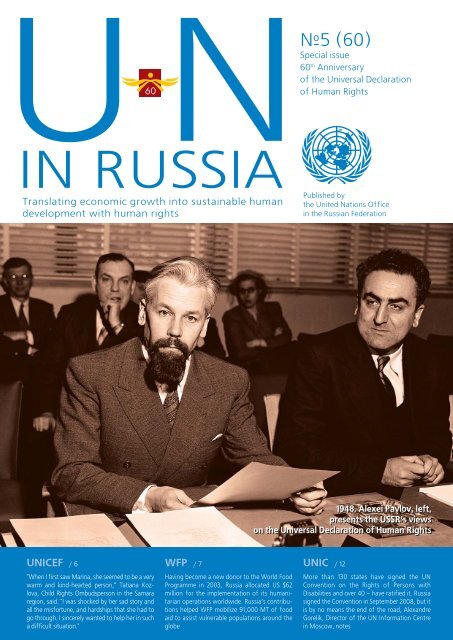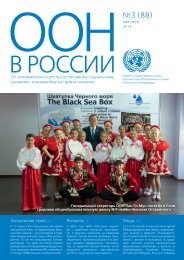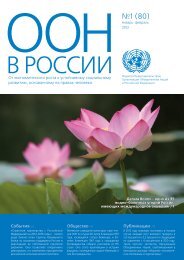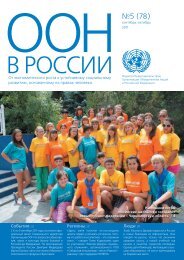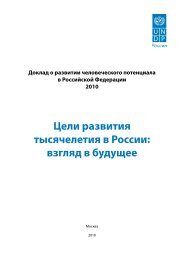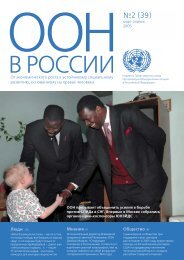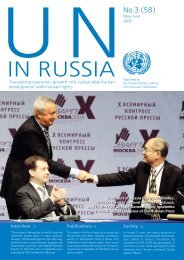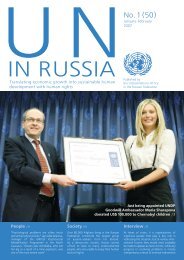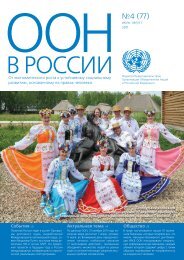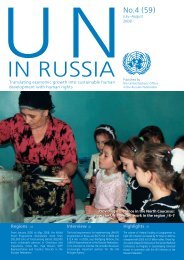Special issue 60th Anniversary of the Universal ... - UN Russia
Special issue 60th Anniversary of the Universal ... - UN Russia
Special issue 60th Anniversary of the Universal ... - UN Russia
- No tags were found...
You also want an ePaper? Increase the reach of your titles
YUMPU automatically turns print PDFs into web optimized ePapers that Google loves.
<strong>UN</strong>№5 (60)<strong>Special</strong> <strong>issue</strong>60 th <strong>Anniversary</strong><strong>of</strong> <strong>the</strong> <strong>Universal</strong> Declaration<strong>of</strong> Human RightsIN RUSSIATranslating economic growth into sustainable humandevelopment with human rightsPublished by<strong>the</strong> United Nations Officein <strong>the</strong> <strong>Russia</strong>n Federation1948. Alexei Pavlov, left,presents <strong>the</strong> USSR's viewson <strong>the</strong> <strong>Universal</strong> Declaration <strong>of</strong> Human Rights<strong>UN</strong>ICEF / 6"When I first saw Marina, she seemed to be a verywarm and kind-hearted person,” Tatiana Kozlova,Child Rights Ombudsperson in <strong>the</strong> Samararegion, said. "I was shocked by her sad story andall <strong>the</strong> misfortune, and hardships that she had togo through. I sincerely wanted to help her in sucha difficult situation."WFP / 7Having become a new donor to <strong>the</strong> World FoodProgramme in 2003, <strong>Russia</strong> allocated US $62million for <strong>the</strong> implementation <strong>of</strong> its humanitarianoperations worldwide. <strong>Russia</strong>’s contributionshelped WFP mobilize 91,000 MT <strong>of</strong> foodaid to assist vulnerable populations around <strong>the</strong>globe<strong>UN</strong>IC / 12More than 130 states have signed <strong>the</strong> <strong>UN</strong>Convention on <strong>the</strong> Rights <strong>of</strong> Persons withDisabilities and over 40 – have ratified it. <strong>Russia</strong>signed <strong>the</strong> Convention in September 2008, but itis by no means <strong>the</strong> end <strong>of</strong> <strong>the</strong> road, AlexandreGorelik, Director <strong>of</strong> <strong>the</strong> <strong>UN</strong> Information Centrein Moscow, notes
Contents<strong>UN</strong>Message<strong>of</strong> <strong>the</strong> <strong>UN</strong> Secretary-General on Human Rights Day 2OHCHRThe <strong>Universal</strong> Declaration <strong>of</strong> Human Rights Turns 60! 3Do You Know Your Rights? 4Human Rights Is an Important Area<strong>of</strong> Cooperation between <strong>UN</strong> and <strong>Russia</strong> 4<strong>UN</strong>ICEFThe Last Resort 6WFP<strong>Russia</strong> Saves Millions from Hunger 7ILOILO and Human Rights at Work 9<strong>UN</strong>A Right to Charity 11<strong>UN</strong>ICICT Accessibility to Disabled: Working In-depth 12<strong>UN</strong>DPWhat is Family for <strong>Russia</strong>n Students? 13<strong>UN</strong>AIDS‘Stars against AIDS’ in Rostov-on-Don 15<strong>UN</strong>HCREveryone Has<strong>the</strong> Right to Seek Asylum… 17WHOA Long Road to Safe Injection 19<strong>UN</strong>ESCOBioethics and Human Rights 20<strong>UN</strong>A <strong>Russia</strong>Youth Pondering over ‘Foundation <strong>of</strong> <strong>the</strong> World’ 22United NationsOn this Human Rights Day, we alsocelebrate <strong>the</strong> <strong>60th</strong> anniversary <strong>of</strong> <strong>the</strong><strong>Universal</strong> Declaration <strong>of</strong> Human Rights.Drafted amid utter destruction anddestitution following <strong>the</strong> Second WorldWar, <strong>the</strong> Declaration reflects humanity’saspirations for a future <strong>of</strong> prosperity,dignity and peaceful coexistence.Its adoption was a landmark. Today,<strong>the</strong> Declaration remains a core part <strong>of</strong> <strong>the</strong> <strong>UN</strong>’s veryidentity.The challenges we face today are as daunting as thosethat confronted <strong>the</strong> Declaration’s drafters.We face a food emergency and a global financialcrisis.Humankind’s assault on <strong>the</strong> natural environmentcontinues.There is political repression in too many countries.Message<strong>of</strong> <strong>the</strong> <strong>UN</strong> Secretary-Generalon Human Rights DayAnd as ever, <strong>the</strong> most vulnerablecontinue to be on <strong>the</strong> frontlines <strong>of</strong>hardship and abuse.The luckiest among us, those who arespared <strong>the</strong> most negative effects <strong>of</strong>disaster, poverty or instability, cannotturn a blind eye. The cascading effects<strong>of</strong> abuse and indifference caneventually engulf <strong>the</strong> entire planet.Rights, and especially <strong>the</strong>ir violation, must hold <strong>the</strong>whole world in solidarity.On this Human Rights Day, it is my hope that we willall act on our collective responsibility to uphold <strong>the</strong>rights enshrined in <strong>the</strong> <strong>Universal</strong> Declaration.We can only honour <strong>the</strong> towering vision <strong>of</strong> thatinspiring document when its principles are fullyapplied everywhere, for everyone.Ban Ki-moon<strong>UN</strong> in <strong>Russia</strong>Published once in two monthsCirculation: 2,000 copieswww.unrussia.ruwww.undp.ruFounder:United Nations Officein <strong>the</strong> <strong>Russia</strong>n FederationEditor-in-Chief: Victoria ZotikovaEditor: Vladimir SadakovAddress:119034, Moscow,Ostozhenka St., 28Tel. 787-21-00Fax: 787-21-01E-mail: vladimir.sadakov@undp.ru<strong>UN</strong> in RUSSIA No.5 (60)The cover photo provided by OHCHR
United NationsHuman RightsOffice <strong>of</strong> High Commissionerfor Human RightsThe <strong>Universal</strong> Declaration<strong>of</strong> Human Rights Turns 60!On 10 December 2008, <strong>the</strong> <strong>Universal</strong> Declaration <strong>of</strong> Human Rights (UDHR) turns 60. The Declarationwas adopted by <strong>the</strong> United Nations General Assembly on 10 December 1948. The date has since servedto mark Human Rights Day worldwide.The Declaration consists <strong>of</strong> a preambleand 30 articles, setting out a broadrange <strong>of</strong> fundamental human rights andfreedoms, to which all men and womeneverywhere in <strong>the</strong> world are entitled,without any distinction.The UDHR is <strong>the</strong> first internationalrecognition that fundamental rightsand freedoms are inalienableand inherent to allhuman beings, that everyone <strong>of</strong> us is born free andequal. The UDHR is a livingdocument that mattersnot only in times <strong>of</strong>conflict and in societiessuffering repression, butalso in addressing socialinjustice and achievinghuman dignity in times <strong>of</strong>peace in establisheddemocracies.N on-discrimination,equality and fairness– key components <strong>of</strong> justiceform <strong>the</strong> foundation<strong>of</strong> <strong>the</strong> UDHR. And nomatter where you live,how much money youhave, what faith youpractice or political views you hold, all <strong>the</strong>human rights in <strong>the</strong> Declaration apply toyou everywhere and always.Indeed, <strong>the</strong> UDHR has inspired morethan 80 international human rightstreaties and declarations, a great number<strong>of</strong> regional human rights conventions,domestic human rights bills, andconstitutional provisions, which toge<strong>the</strong>rconstitute a comprehensive legallybinding system for <strong>the</strong> promotion andprotection <strong>of</strong> human rights. Building on<strong>the</strong> achievements <strong>of</strong> <strong>the</strong> UDHR, <strong>the</strong>International Covenant on Civil andPolitical Rights and <strong>the</strong> InternationalCovenant on Economic, Social andCultural Rights entered into force in1976. Toge<strong>the</strong>r with <strong>the</strong> UDHR, <strong>the</strong>Covenants comprise <strong>the</strong> InternationalBill <strong>of</strong> Human Rights.Today, all United Nations memberstates have ratified at least one <strong>of</strong><strong>the</strong> nine core international humanrights treaties, and 80 percent have ratifiedfour or more, giving concreteexpression to <strong>the</strong> universality <strong>of</strong> <strong>the</strong>UDHR and international human rights.The UDHR is <strong>the</strong> most translated documentin <strong>the</strong> world. It was translatedinto more than 330 languages: from <strong>the</strong>six <strong>UN</strong> <strong>of</strong>ficial languages -Arabic, Chinese,English, French, <strong>Russia</strong>n, and Spanish spokenby billions <strong>of</strong> people, to Pipil, spokenby some 50 people in El Salvador andHonduras.The anniversary campaign is symbolizedby <strong>the</strong> UDHR60 logo,which depicts a human shape standingwith arms wide open. The yellowand red symbol represents liberationand equality. The yellow is a sign <strong>of</strong>peace and warmth. The symbol is seton a solid block which represents <strong>the</strong>foundation <strong>of</strong> human rights. Theearthy red colour <strong>of</strong> <strong>the</strong> block reinforceshuman rights as a foundationstone and as humankind’s commonheritage. The UDHR60 logo comeswith words thatencapsulate <strong>the</strong> promise<strong>of</strong> <strong>the</strong> Declaration:“Dignity andjustice for all <strong>of</strong> us”.It reinforces <strong>the</strong>vision <strong>of</strong> <strong>the</strong> UDHRas <strong>the</strong> first internationalrecognitionthat fundamentalrights and freedomsare inalienable andinherent to all humanbeings, thatevery one <strong>of</strong> us isborn free and equal.The phrase alsoserves as a rallyingcall, for <strong>the</strong> promise<strong>of</strong> dignity and justiceis far from realizedfor everyone.Pr<strong>of</strong>essor Vladimir M. Koretsky, USSR representative(left), greets Dr. Charles Malik,Rapporteur <strong>of</strong> <strong>the</strong> Drafting Committee <strong>of</strong>UDHR<strong>UN</strong> in RUSSIA No.5 (60) 3
Do You Know Your Rights?1. Non-discrimination.2. Life.3. Liberty and security <strong>of</strong> <strong>the</strong> person.4. Protection against slaveryand servitude.5. Protection against torture.6. Legal personality.7. Equal protection <strong>of</strong> <strong>the</strong> law.8. Legal remedy.9. Protection against arbitrary arrest,detention, or exile.10. Access to independentand impartial tribunal.11. Presumption <strong>of</strong> innocence.12. Protection againstex post facto laws.13. Privacy, family, homeand correspondence.14. Freedom <strong>of</strong> movementand residence.15. Nationality.16. Marry and found a family.17. Protection and assistance<strong>of</strong> families.18. Marriage only with freeconsent <strong>of</strong> spouses.19. Equal rights <strong>of</strong> men andwomen in marriage.20. Freedom <strong>of</strong> thought,conscience and religion.21. Freedom <strong>of</strong> opinionand expression.22. Freedom <strong>of</strong> <strong>the</strong> press.23. Freedom <strong>of</strong> assembly.24. Freedom <strong>of</strong> association.25. Participation in government.26. Social security.27. Work.28. No compulsory or forced labour.29. Just and favourable conditions<strong>of</strong> work.30. Trade unions.31. Rest, leisure and paid holidays.32. Adequate standard <strong>of</strong> living.33. Education.34. Participation in cultural life.35. Self-determination.36. Protection <strong>of</strong> andassistance to children.37. Freedom from hunger.38. Health.39. Asylum.40. Property.41. Compulsory primary education.42. Humane treatment whendeprived <strong>of</strong> liberty.43. Protection againstimprisonment for debt.44. Expulsion <strong>of</strong> aliens only by law.45. Prohibition <strong>of</strong> war propagandaand incitement to discrimination.46. Minority culture.47. No imprisonment for breach<strong>of</strong> civil obligations.48. Protection <strong>of</strong> children.49. Access to public service.50. Democracy.51. Participation in culturaland scientific life.52. Protection <strong>of</strong> intellectualproperty rights.53. International and social orderfor realizing rights.54. Political self-determination.55. Economic self-determination.56. Women’s rights.57. Prohibition <strong>of</strong> <strong>the</strong> death penalty.58. Prohibition <strong>of</strong> apar<strong>the</strong>id.Human Rights Is an Important Area<strong>of</strong> Cooperation between <strong>UN</strong> and <strong>Russia</strong>On <strong>the</strong> eve <strong>of</strong> <strong>the</strong> 60-th anniversary <strong>of</strong><strong>the</strong> <strong>Universal</strong> Declaration <strong>of</strong> HumanRights, Dirk Hebecker, Senior HumanRights Adviser <strong>of</strong> <strong>the</strong> <strong>UN</strong> Country teamin RF, Representative <strong>of</strong> <strong>the</strong> UnitedNations High Commissioner forHuman Rights, gave an exclusive interviewto <strong>UN</strong> in <strong>Russia</strong>.– Mr. Hebecker, let us introduce <strong>the</strong> organizationyou work for to our readers.– The Office <strong>of</strong> <strong>the</strong> United Nations HighCommissioner for Human Rights(OHCHR) helps protect and promote allhuman rights around <strong>the</strong> world. TheOffice, with headquarters in Geneva, isalso present in over 40 countries.OHCHR works to ensure <strong>the</strong> enforcement<strong>of</strong> universally recognized humanrights norms, including through promotingboth <strong>the</strong> universal ratificationand implementation <strong>of</strong> human rightstreaties and respect for <strong>the</strong> rule <strong>of</strong> law. Italso aims to remove obstacles to <strong>the</strong> fullrealization <strong>of</strong> all human rights and toprevent or stop human rights abuses.You can learn much more about it onwww.ohchr.org– The OHCHR Office has started working in<strong>Russia</strong> ra<strong>the</strong>r recently. How did this comeabout?– Following <strong>the</strong> agreement between <strong>the</strong>Office <strong>of</strong> <strong>the</strong> United Nations HighCommissioner for Human Rights(OHCHR) and <strong>the</strong> Government <strong>of</strong> <strong>the</strong><strong>Russia</strong>n Federation, a human rights presencewas established within <strong>the</strong> UnitedNations Country Team (<strong>UN</strong>CT) in <strong>the</strong><strong>Russia</strong>n Federation in January 2006. TheHigh Commissioner's two visits to <strong>the</strong><strong>Russia</strong>n Federation in 2005 and 2006 providedopportunities for <strong>the</strong> consolidationand streng<strong>the</strong>ning <strong>of</strong> cooperation withnational partners. Throughout <strong>the</strong> year2007, comprehensive consultations concerning<strong>the</strong> content and forms <strong>of</strong> longer-4<strong>UN</strong> in RUSSIA No.5 (60)
term cooperation to promote humanrights in <strong>the</strong> <strong>Russia</strong>n Federation tookplace with OHCHR’s counterparts inMoscow. As a result, a “Framework forCooperation with <strong>the</strong> <strong>Russia</strong>n Federationfor 2007 and beyond” was elaborated andapproved through an exchange <strong>of</strong> lettersbetween <strong>the</strong> High Commissioner and <strong>the</strong>Minister <strong>of</strong> Foreign Affairs in August 2007.Finally, <strong>the</strong> Senior Human Rights Advisorto represent OHCHR in <strong>the</strong> <strong>UN</strong> CountryTeam and in <strong>the</strong> <strong>Russia</strong>n Federationarrived in Moscow in March 2008.– Could you say a few words about thisdocument, please. And what is <strong>the</strong> overallpurpose <strong>of</strong> <strong>the</strong> OHCHR’s presence in<strong>Russia</strong>?– The Framework for Cooperation clustersaround four areas:• rule <strong>of</strong> law;• equality and tolerance;• education and information on humanrights;• and mainstreaming human rightswithin <strong>the</strong> <strong>UN</strong> Country Team in <strong>the</strong><strong>Russia</strong>n Federation.Based on <strong>the</strong> Framework <strong>of</strong> Cooperation,OHCHR’s presence in Moscow is aimed atproviding an added value to <strong>the</strong> efforts <strong>of</strong>different stakeholders in <strong>the</strong> promotion<strong>of</strong> human rights at <strong>the</strong> national level, witha particular view to ensure coherence,sustainability, creativity, and effectiveness,through better articulation <strong>of</strong>human rights dimensions, complementarities,and coordination with various<strong>UN</strong> agencies, government institutions,and civil society.– You started working in Moscow in March2008. What has been achieved since <strong>the</strong>n?– We have managed to establish closeworking relations and partnerships withgovernment institutions at <strong>the</strong> federaland regional levels, <strong>UN</strong> agencies, and with<strong>the</strong> civil society, including NGOs, academiaand o<strong>the</strong>r parties interested in putting<strong>the</strong> Framework <strong>of</strong> Cooperation intopractice. We have studied <strong>the</strong> situation in<strong>the</strong> field and presented our work duringour multiple s trips to <strong>Russia</strong>’s regions. Inaddition, we have participated in manyevents dedicated to human rights, whichwere organized by government bodies,United Nations, and <strong>the</strong> civil society. Forexample, a lot <strong>of</strong> efforts have beenexerted into <strong>the</strong> promotion <strong>of</strong> <strong>the</strong> <strong>UN</strong>Convention on <strong>the</strong> Rights <strong>of</strong> Persons withDisabilities, which <strong>the</strong> <strong>Russia</strong>n FederationThe Moscow International Book Fair – 2008: <strong>the</strong> materials on human rightsat <strong>the</strong> <strong>UN</strong> expositionsigned last September. We have also dealtwith <strong>issue</strong>s related to <strong>the</strong> rights <strong>of</strong> indigenouscommunities; education in <strong>the</strong> area<strong>of</strong> human rights; preparations for <strong>the</strong>60-th anniversary <strong>of</strong> <strong>the</strong> <strong>Universal</strong>Declaration <strong>of</strong> Human Rights; andstreng<strong>the</strong>ning <strong>of</strong> <strong>the</strong> institute <strong>of</strong> <strong>the</strong>Ombudsman on human rights at <strong>the</strong>federal and regional levels.– Could you, please, tell us about yourplans for <strong>the</strong> nearest future?– We have planned a lot for <strong>the</strong> next twoyears:We are going to assist in <strong>the</strong> establishment<strong>of</strong> a human rights internet resourcefor judges. It will be intended for a widedissemination <strong>of</strong> human rights informationand exchange <strong>of</strong> experience and bestpractices among national judges.An important priority for us is <strong>the</strong> promotion<strong>of</strong> administrative justice through,inter alia, an international seminar on <strong>the</strong>role <strong>of</strong> administrative justice in <strong>the</strong> protection<strong>of</strong> human rights.We intend to support, toge<strong>the</strong>r with o<strong>the</strong>r<strong>UN</strong> agencies, national efforts aimed atstreng<strong>the</strong>ning <strong>the</strong> administration <strong>of</strong> justicetowards juvenile <strong>of</strong>fenders, in accordancewith <strong>the</strong> concluding observations<strong>of</strong> <strong>the</strong> Committee on <strong>the</strong> Rights <strong>of</strong> <strong>the</strong>Child relating to juvenile justice.We will work with higher education andacademic institutions for <strong>the</strong> support <strong>of</strong><strong>the</strong> <strong>Russia</strong>n-speaking component <strong>of</strong> <strong>the</strong>OHCHR fellowship programme for representatives<strong>of</strong> indigenous peoples toenhance <strong>the</strong>ir knowledge <strong>of</strong> humanrights, particularly in relation to indigenouspeoples, and <strong>of</strong> <strong>the</strong> work <strong>of</strong> <strong>UN</strong>human rights protection mechanisms.We welcome <strong>the</strong> fact that <strong>the</strong> <strong>Russia</strong>nFederation signed <strong>the</strong> <strong>UN</strong> Convention on<strong>the</strong> Rights <strong>of</strong> Persons with Disabilities lastSeptember, and we will support <strong>the</strong>national efforts aimed at promoting andbuilding consensus around <strong>the</strong> eventualratification <strong>of</strong> this Convention.Promotion <strong>of</strong> a culture <strong>of</strong> tolerance andnon-discrimination to prevent xenophobiaand related intolerance, gender discrimination,and violence against womenis also among our priorities.We have already started working towardsimproving <strong>the</strong> education <strong>of</strong> human rightspr<strong>of</strong>essionals by facilitating <strong>the</strong> establishment<strong>of</strong> a human rights master’sprogramme (M.A.) in partnership withleading <strong>Russia</strong>n universities.Through dissemination <strong>of</strong> documents oninternational human rights mechanismsand procedures we hope to promoteaccess to human rights information.And finally, we will contribute to <strong>the</strong>mainstreaming <strong>of</strong> human rights andpromotion <strong>of</strong> a human-rights basedapproach to programming within <strong>the</strong><strong>UN</strong> Country Team in <strong>the</strong> <strong>Russia</strong>nFederation.OHCHRTel.: (7 495) 787–21–00Fax: (7 495) 787–21–01E-mail: ohchr.russia@undp.ruWeb site: www.unrussia.ru<strong>UN</strong> in RUSSIA No.5 (60) 5
Tatiana and her colleagues pay regularvisits to <strong>the</strong> Zhigulevsk juvenile correctionalfacility to meet with young peopleserving <strong>the</strong>ir term and provide whateverhelp is needed. The assistance is notnecessarily <strong>of</strong> a legal or administrativenature; it may be just <strong>of</strong>fering a helpinghand. “Recently, one <strong>of</strong> young people at<strong>the</strong> facility turned to us with a request t<strong>of</strong>ind his bro<strong>the</strong>r, and, just imagine, wehave indeed found him!” Tatiana recallswith a smile.Ombudspersons for children have alot <strong>of</strong> work to do, and <strong>the</strong>ir workloadis unlikely to decrease in <strong>the</strong> nearfuture. These highly-skilled expertsmanage to address <strong>issue</strong>s that sometimesseem impossible to resolve; <strong>the</strong>yhelp children to grow up and develop ina more friendly and supportive socialenvironment. It is for this reason that<strong>UN</strong>ICEF has no intention to give up itssupport for <strong>the</strong> institution <strong>of</strong> children’sombudspersons in <strong>Russia</strong> and intends t<strong>of</strong>ur<strong>the</strong>r promote <strong>the</strong> development <strong>of</strong><strong>the</strong>ir network.Yelena Andreeva, Anna KochinevaMore information is availableat www.unicef.ruand www.ombudsmandeti.ru<strong>UN</strong>ICEFTel.: (7 495) 933–88–18Fax: (7 495) 933–88–19www.unicef.ruWorld Food Programme<strong>Russia</strong> Saves Millionsfrom Hunger"Everyone, as a member <strong>of</strong> society, has <strong>the</strong> right to social security and is entitled to realization, throughnational effort and international co-operation and in accordance with <strong>the</strong> organization and resources<strong>of</strong> each State, <strong>of</strong> <strong>the</strong> economic, social and cultural rights indispensable for his dignity and <strong>the</strong> freedevelopment <strong>of</strong> his personality."(Article 22 <strong>of</strong> <strong>Universal</strong> Declaration <strong>of</strong> Human Rights)Over fifty years after <strong>the</strong> adoption <strong>of</strong><strong>the</strong> <strong>Universal</strong> Declaration <strong>of</strong> HumanRights, 923 million people on <strong>the</strong> planetsuffer from hunger, including 820 millionin <strong>the</strong> developing world, 25 million incountries in transition, and 9 million indeveloped states. Today, death fromhunger threatens every seventh person in<strong>the</strong> world, which makes hunger and malnutritiona major threat to people, moredangerous than AIDS, malaria, and tuberculosis.The mankind does not turn a coldshoulder on those starving – <strong>the</strong>y ge<strong>the</strong>lp from individuals, NGOs, privatecompanies, and most <strong>of</strong> all from states.For several years now, <strong>the</strong> <strong>Russia</strong>nArrival <strong>of</strong> <strong>the</strong> <strong>Russia</strong>n donation to WFP for humanitarian aid to Azerbaijan.December 2007.Federation has been in this honourablelist <strong>of</strong> donors.In 2008, <strong>the</strong> Federal Law on <strong>the</strong> StateBudget for 2008 and for <strong>the</strong> PlannedPeriod <strong>of</strong> 2009 and 2010 stipulated aUS $11 million contribution to <strong>the</strong>World Food Programme (WFP) in2008, US $15 million – in 2009, and US$15 million – in 2010.relationship between WFP and“T<strong>the</strong> <strong>Russia</strong>n Federation has grownever stronger over <strong>the</strong> past few years, andI would like to thank <strong>Russia</strong> for <strong>the</strong>generous support,” said Ms JosetteSheeran, WFP Executive Director, afterlearning about <strong>Russia</strong>’s planned contributionsfor <strong>the</strong> next three years.he role <strong>of</strong> <strong>Russia</strong> as a donor is“Tincreasing in view <strong>of</strong> food pricesgrowth that entails a global food crisis,”said Ms Inge Breuer, WFPRepresentative and Country Directorin <strong>the</strong> <strong>Russia</strong>n Federation, whoparticipated in <strong>the</strong> work <strong>of</strong> a group <strong>of</strong>experts on developing <strong>UN</strong> strategies inresponse to <strong>the</strong> global food crisis inNew York in June.According to recent forecasts, <strong>the</strong>number <strong>of</strong> people in <strong>the</strong> world inneed <strong>of</strong> food aid will increase by 100,000<strong>UN</strong> in RUSSIA No.5 (60) 7
InternationalLabourOrganizationILOand Human Rights at WorkDeclaration on Fundamental Principlesand Rights at Work, which states thatMembers <strong>of</strong> <strong>the</strong> ILO, even if <strong>the</strong>y have notratified <strong>the</strong> relevant Conventions, have anobligation arising from <strong>the</strong>ir very membershipto respect, promote, and realize<strong>the</strong> principles <strong>of</strong> freedom <strong>of</strong> associationand <strong>the</strong> effective recognition <strong>of</strong> <strong>the</strong> rightto collective bargaining; <strong>the</strong> elimination<strong>of</strong> all forms <strong>of</strong> forced or compulsorylabour; <strong>the</strong> effective abolition <strong>of</strong> childinstrument, as it mainly provides for <strong>the</strong>protection <strong>of</strong> that freedom against potentialrestrictions or infringements by <strong>the</strong>State. It equally protects <strong>the</strong> right <strong>of</strong> bothworkers and employers to set up and joinorganizations <strong>of</strong> <strong>the</strong>ir own choosing, aswell as <strong>the</strong> right <strong>of</strong> <strong>the</strong>se organizations t<strong>of</strong>reely decide on <strong>the</strong>ir internal matterswithout interference from public authorities.It was supplemented one year laterby <strong>the</strong> Right to Organize and CollectiveWe tend nowadays to take it forgranted that human rights are at<strong>the</strong> core <strong>of</strong> <strong>the</strong> mandate <strong>of</strong> <strong>the</strong>International Labour Organization, but<strong>the</strong> very notion had not yet found its wayinto positive international law, when <strong>the</strong>organization was founded in 1919 with aview to develop international regulation<strong>of</strong> conditions <strong>of</strong> employment and work.Instead, its Constitution referred to <strong>the</strong>pursuit <strong>of</strong> social justice as its driving principle.This does not prevent ILO standardsfrom being closely related to <strong>the</strong> universalvalues <strong>of</strong> freedom, equality, and dignitylaid down in <strong>the</strong> <strong>Universal</strong> Declaration <strong>of</strong>Human Rights, and many provisions <strong>of</strong><strong>the</strong> subsequently adopted InternationalCovenant on Economic, Social andCultural Rights coincide with ILO standardsin <strong>the</strong> same areas that had alreadybeen adopted.The year <strong>of</strong> <strong>the</strong> 50th anniversary <strong>of</strong> <strong>the</strong><strong>Universal</strong> Declaration <strong>of</strong> HumanRights also saw <strong>the</strong> adoption by <strong>the</strong>International Labour Conference <strong>of</strong> <strong>the</strong>labour; and <strong>the</strong> elimination <strong>of</strong> discriminationin respect <strong>of</strong> employment and occupation.These four principles areexpressed and developed in <strong>the</strong> form <strong>of</strong>specific rights and obligations in eightConventions recognized as fundamentalboth inside and outside <strong>the</strong> ILO.Adopted a few months before <strong>the</strong><strong>Universal</strong> Declaration proclaimed <strong>the</strong>right to freedom <strong>of</strong> association and t<strong>of</strong>orm and join trade unions, <strong>the</strong> Freedom<strong>of</strong> Association and Protection <strong>of</strong> <strong>the</strong> Rightto Organize Convention, 1948 (No. 87),can be seen as a ‘classic’ human rightsBargaining Convention, 1949 (No. 98),which is a more typical ILO instrumentaddressing relations between employersand workers. Convention No. 98 aims atensuring <strong>the</strong> protection <strong>of</strong> workersagainst anti-union discrimination and<strong>the</strong> independence <strong>of</strong> workers’ andemployers’ organizations against interferenceby each o<strong>the</strong>r. It also provides for<strong>the</strong> promotion <strong>of</strong> collective bargaining.The fundamental principle <strong>of</strong> elimination<strong>of</strong> forced or compulsory labour isset out in two different Conventions, whichwere adopted in different contexts. The<strong>UN</strong> in RUSSIA No.5 (60) 9
adoption <strong>of</strong> <strong>the</strong> Forced Labour Convention,1930 (No. 29) followed <strong>the</strong> 1926 SlaveryConvention <strong>of</strong> <strong>the</strong> League <strong>of</strong> Nations, with<strong>the</strong> main purpose at that time <strong>of</strong> putting anend to <strong>the</strong> practice <strong>of</strong> compulsory labourused by colonial powers in <strong>the</strong>ir colonies.However, it remains fully valid for independentcountries. The Convention providesin particular a definition <strong>of</strong> forcedlabour, which needs to be suppressed as “allwork or service, which is exacted from anyperson under <strong>the</strong> menace <strong>of</strong> any penaltyand for which <strong>the</strong> said person has not<strong>of</strong>fered himself voluntarily”. It includes alimitative list <strong>of</strong> circumstances in whichwork can none<strong>the</strong>less be imposed, such ascompulsory military service, as a consequence<strong>of</strong> conviction in a court <strong>of</strong> law or incases <strong>of</strong> emergency.The Abolition <strong>of</strong> <strong>the</strong> Forced LabourConvention, 1957 (No. 105), does notrevise but supplement Convention No. 29.Following <strong>the</strong> experience <strong>of</strong> massiverecourse to forced labour during WorldWar II, it was adopted in 1957 to combatemerging new forms <strong>of</strong> forced or compulsorylabour that were witnessed at thattime. In particular, it fur<strong>the</strong>r protects <strong>the</strong>right to freedom <strong>of</strong> opinion and expressionconsecrated in <strong>the</strong> <strong>Universal</strong>Declaration by prohibiting <strong>the</strong> use <strong>of</strong> anyform <strong>of</strong> forced labour “as a means <strong>of</strong> politicalcoercion or education, or as apunishment for holding or expressingpolitical views, or views ideologicallyopposed to <strong>the</strong> established political,social or economic system.” It also prohibitsforced labour as a method <strong>of</strong> labourmobilisation for economic development.Equality <strong>of</strong> opportunity and treatmentat work is also supported by two conventions.The Equal RemunerationConvention, 1951 (No. 100), has <strong>the</strong>limited although important objective <strong>of</strong>achieving equal remuneration betweenmen and women for work <strong>of</strong> equal value.It is worth noting that <strong>the</strong> principle doesnot only apply to <strong>the</strong> salary or wage butalso to any additional payment in cash orkind arising from <strong>the</strong> worker’s employmentand also that it refers to work <strong>of</strong>equal value ra<strong>the</strong>r than equal work.The Discrimination (Employment andOccupation) Convention, 1958 (No.111) was adopted with <strong>the</strong> broader objective<strong>of</strong> elimination <strong>of</strong> all discriminationsin all aspects <strong>of</strong> employment and occupation.It defines discrimination as any distinction,exclusion or preference made oncertain grounds, which has <strong>the</strong> effect <strong>of</strong>nullifying or impairing equality <strong>of</strong> opportunity,or treatment. The Convention listsseven grounds <strong>of</strong> prohibited discrimination– race, colour, sex, religion, politicalopinion, national extraction, and socialorigin – but leaves <strong>the</strong> possibility to ratifyingStates <strong>of</strong> extending <strong>the</strong> protectionafforded by <strong>the</strong> Convention to o<strong>the</strong>rgrounds <strong>of</strong> discrimination.The Minimum Age Convention, 1973(No. 138), is a consolidation <strong>of</strong> previousinstruments adopted by <strong>the</strong> ILO since 1919to regulate minimum age <strong>of</strong> admission toemployment or work in various sectors,and it applies to all sectors <strong>of</strong> economicactivity, whe<strong>the</strong>r or not children areemployed for wages. It requires a minimumage to be specified and raised progressively,which cannot be less than <strong>the</strong> age <strong>of</strong> compulsoryschooling and normally 15 years <strong>of</strong>age. A higher minimum age <strong>of</strong> no less than18 years must be set for employment orwork likely to jeopardize <strong>the</strong> health, safety,or morals <strong>of</strong> young persons while lightwork <strong>of</strong> children <strong>of</strong> 13 to 15 years can beauthorized provided such work does notprejudice <strong>the</strong>ir schooling.The Worst Forms <strong>of</strong> Child LabourConvention, 1999 (No. 182), does notrevise or replace in any way ConventionNo. 138. It was adopted in recognition <strong>of</strong><strong>the</strong> fact that, if <strong>the</strong> ultimate objective <strong>of</strong><strong>the</strong> effective elimination <strong>of</strong> child labourdepends on economic factors and maytake time to be accomplished, <strong>the</strong>re arecertain forms <strong>of</strong> child labour that cannotbe tolerated and subject to progressiveelimination. Therefore, Convention No.182 calls for immediate action to secure<strong>the</strong> prohibition and elimination <strong>of</strong> <strong>the</strong>worst forms <strong>of</strong> child labour, irrespective<strong>of</strong> <strong>the</strong> level <strong>of</strong> development or economicsituation <strong>of</strong> <strong>the</strong> country. These worstforms against which all persons under <strong>the</strong>age <strong>of</strong> 18 must be protected comprise: allforms <strong>of</strong> slavery or similar practices, suchas sale and trafficking, debt bondage,serfdom and forced or compulsorylabour, including <strong>the</strong> use <strong>of</strong> children inarmed conflicts; <strong>the</strong> use <strong>of</strong> a child forprostitution or pornography; <strong>the</strong> use <strong>of</strong> achild for illicit activities such as drugtrafficking; and work likely to harm <strong>the</strong>health, safety or morals <strong>of</strong> children, asdetermined at <strong>the</strong> national level.<strong>Universal</strong> ratification <strong>of</strong> <strong>the</strong>se fundamentalconventions is now withinreach, as suggested by a current globalratification rate <strong>of</strong> about 90% amongILO Member States. For <strong>the</strong>se countries,this does not only mean a legal commitmentto ensure full respect for humanrights in <strong>the</strong> world <strong>of</strong> work, but alsoaccepting that <strong>the</strong>ir compliance be subjectto <strong>the</strong> scrutiny by tripartite bodieswith participation <strong>of</strong> governments,employers, and workers representatives.This will allow <strong>the</strong> ILO unique structureand procedures to continue assisting <strong>the</strong>international community in overcoming<strong>the</strong> ever renewed challenges to <strong>the</strong>effective observance <strong>of</strong> rights proclaimedsixty years ago.Alain PELCE,Senior InternationalLabour Standards <strong>Special</strong>istILO Subregional Officefor Eastern Europe and Central AsiaILO Moscow15 Petrovka St., <strong>of</strong>fice 23,tel.: +7 (495) 933-58-93Fax: +7 (495) 933-08-20Web site: www.ilo.org10ООН В РОССИИ №5 (60)
United NationsA Right to Charity“Everyone has <strong>the</strong> right to a standard <strong>of</strong> living adequate for <strong>the</strong> health and well-being <strong>of</strong> himself and<strong>of</strong> his family, including food, clothing, housing and medical care and necessary social services, and <strong>the</strong>right to security in <strong>the</strong> event <strong>of</strong> unemployment, sickness, disability, widowhood, old age or o<strong>the</strong>r lack<strong>of</strong> livelihood in circumstances beyond his control.”(Article 25 <strong>of</strong> <strong>Universal</strong> Declaration <strong>of</strong> Human Rights)On 13 October 2008 in <strong>the</strong> PushkinState Museum <strong>of</strong> Fine Arts, <strong>the</strong>award ceremony <strong>of</strong> <strong>the</strong> ‘CorporateDonor <strong>of</strong> <strong>Russia</strong> 2008’ competition tookplace. The Donors Forum organized thiscompetition for businesses, involved incharitable and social responsibility projectsfor <strong>the</strong> third time in a row. A representativeteam <strong>of</strong> organizers includedboth government structures and civilsociety institutions. For <strong>the</strong> first time,<strong>the</strong> United Nations Office in <strong>the</strong> <strong>Russia</strong>nFederation joined <strong>the</strong>m, proposing <strong>the</strong>nomination, ‘Best programme, contributingto <strong>the</strong> creation <strong>of</strong> favourableenvironment for life and work <strong>of</strong> disabledpeople – support to people withdisabilities to ensure <strong>the</strong>ir equal participationin <strong>the</strong> life <strong>of</strong> <strong>the</strong> society’.Two years ago, <strong>the</strong> United NationsGeneral Assembly adopted <strong>the</strong> <strong>UN</strong>Convention on <strong>the</strong> Rights <strong>of</strong> Persons withDisabilities. The document determinednew approaches to this large <strong>issue</strong>,Alexandre Gorelik, Director <strong>of</strong> <strong>the</strong> <strong>UN</strong>Information Centre in Moscow, reminded<strong>the</strong> participants. “This approach meansthat disabled people are no longer perceivedas an object <strong>of</strong> care, protection,and social help alone,” Mr. Gorelikexplained. “The focus is on viewing <strong>the</strong>mas members <strong>of</strong> <strong>the</strong> society <strong>the</strong> same alleverybody else and on <strong>the</strong> promotion <strong>of</strong><strong>the</strong>ir full integration through <strong>the</strong> implementation<strong>of</strong> <strong>the</strong>ir rights. The good newswas that <strong>Russia</strong> signed <strong>the</strong> Convention at<strong>the</strong> end <strong>of</strong> September.”Ensuring equal rights and opportunitiesfor people with disabilities in <strong>the</strong><strong>Russia</strong>n Federation is a major <strong>issue</strong> today.According to <strong>of</strong>ficial data, over 14 millionpeople in <strong>Russia</strong> have a disability, and lessthan 15 percent <strong>of</strong> disabled people have apermanent job. Their access to educationis limited, too.nclusive Education’ project presented‘Iby Amway company met all criteriafor <strong>the</strong> award and became <strong>the</strong> winner in<strong>the</strong> United Nations nomination. Thistrading company organized <strong>the</strong> collection<strong>of</strong> charity funds among its customers,employees, and distributors. The moneywas raised to create inclusive schools inUlan-Ude, in which children with disabilitieswould study toge<strong>the</strong>r with <strong>the</strong>irmates. The initiators aimed at attracting<strong>the</strong> society’s attention to <strong>the</strong> problems <strong>of</strong>children with disabilities, to give <strong>the</strong>m achance to get education, to overcomesocial isolation, and to become equalmembers <strong>of</strong> <strong>the</strong> society.Amway’s partners in <strong>the</strong> project were<strong>the</strong> <strong>UN</strong> Children Fund (<strong>UN</strong>ICEF) and<strong>the</strong> regional public organization <strong>of</strong> <strong>the</strong>disabled, ‘Perspektiva’, which wereresponsible for creating <strong>the</strong> inclusiveschools. Meanwhile <strong>the</strong> company startedcollecting money, as <strong>the</strong> first stage <strong>of</strong> <strong>the</strong>project. Thanks to donations and sales <strong>of</strong>some special goods, 2.5 million roubleswere raised during seven months <strong>of</strong> 2007.The second stage included preparation <strong>of</strong>a social environment – <strong>the</strong> pupils, <strong>the</strong>irparents, and teachers – for <strong>the</strong> inclusiveeducation. The third stage <strong>of</strong> <strong>the</strong> programmerequires <strong>the</strong> establishment <strong>of</strong> anon-barrier environment at schools. In2008, <strong>the</strong> installation <strong>of</strong> special equipmenthas started, including ramps andelevators.As a result, <strong>the</strong> schools No. 4 and No. 65<strong>of</strong> Ulan-Ude welcomed <strong>the</strong> childrenwith disabilities in September 2008.he <strong>UN</strong> Office plans to support this“Tnomination in <strong>the</strong> future as well,”Alexandre Gorelik underlined at <strong>the</strong> end<strong>of</strong> his remarks, “and we do hope that <strong>the</strong>number <strong>of</strong> philanthropists and do-gooders,who will compete for it, will increase.”These hopes have some real grounds,judging from <strong>the</strong> general results <strong>of</strong> <strong>the</strong>‘Corporate Donor <strong>of</strong> <strong>Russia</strong> 2008’ competition.This year, <strong>the</strong> competition broughttoge<strong>the</strong>r 26 companies with <strong>the</strong>ir jointexpenditures for charity accounting for13.8 billion roubles. According to expertestimates, some 70% <strong>of</strong> companies in<strong>Russia</strong> donate money for charity purposes,and <strong>the</strong>ir number grows steadily.<strong>UN</strong> <strong>Russia</strong>Tel.: (7 495) 787–21–00Fax: (7 495) 787–21–01E-mail: <strong>of</strong>fice@undp.ruWeb site: www.unrussia.ruООН В РОССИИ №5 (60) 11
<strong>UN</strong> Information CentreICT Accessibilityto Disabled: Working In-depthAs is known, <strong>the</strong> Convention on <strong>the</strong>rights <strong>of</strong> <strong>the</strong> disabled was adoptedby <strong>the</strong> <strong>UN</strong> General Assembly inDecember 2006. By now, more than 130countries have signed it, and over 40states have ratified it. On 24 September,<strong>Russia</strong> signed <strong>the</strong> Convention, althoughthis is by no means, <strong>the</strong> end <strong>of</strong> <strong>the</strong> road.Now, a complex process <strong>of</strong> inter-agencycoordination lays ahead, which precedes<strong>the</strong> ratification <strong>of</strong> <strong>the</strong> Conventionby <strong>the</strong> Duma. The civil society organizations,<strong>UN</strong> representatives, and all <strong>the</strong>advocates <strong>of</strong> <strong>the</strong> full inclusion <strong>of</strong> <strong>the</strong>disabled people need to put into it a lot<strong>of</strong> energy and persistent efforts.One <strong>of</strong> <strong>the</strong> innovative elements in<strong>the</strong> Convention are its provisionsrelating to information and communicationstechnologies (ICT) – bothfrom <strong>the</strong> point <strong>of</strong> view <strong>of</strong> <strong>the</strong> “digitalaccess” and assistive technologicalsolutions. As a matter <strong>of</strong> fact, it is for<strong>the</strong> first time ever, that <strong>the</strong> access toICT has been declared a human right,along with <strong>the</strong> access to physical environmentand means <strong>of</strong> transportation.Not surprisingly, 14 <strong>of</strong> 32 substantiveprovisions <strong>of</strong> <strong>the</strong> Convention dealwith <strong>the</strong> states’ obligations in <strong>the</strong> field <strong>of</strong>ICT. The cross-cutting <strong>the</strong>me in <strong>the</strong> documentis <strong>the</strong> cost-related availability <strong>of</strong>possible technological solutions, so that<strong>the</strong>se would not be beyond <strong>the</strong> reach <strong>of</strong>many people, first <strong>of</strong> all, in poor countriesor lower social strata in <strong>the</strong> industrializedstates.In implementing <strong>the</strong> provisions <strong>of</strong> <strong>the</strong>Convention, <strong>the</strong> member states willneed to amend <strong>the</strong>ir domestic legislation,instructions, and programs <strong>of</strong> action inthree large areas:1. Norms, specifically, in such areas as“electronic government,” employment,education, mass media and Internet,trade and services, freedom <strong>of</strong> speech,mobility, standards <strong>of</strong> living, cultureand leisure.2. Introduction <strong>of</strong> assistive technologies,including in <strong>the</strong> field <strong>of</strong> education,designed to assist <strong>the</strong> disabledpeople in emergency situations andprovide for <strong>the</strong>ir mobility andautonomy.3. Support <strong>of</strong> R&D and efforts by industrialand commercial entities promotingICT, including through state–privatepartnerships.The <strong>UN</strong> endeavors to play <strong>the</strong> role <strong>of</strong> alocomotive in raising <strong>the</strong> <strong>issue</strong> at <strong>the</strong>political level. The General Assemblyreferred to this <strong>the</strong>me in a number <strong>of</strong> itsresolutions. An ever greater number <strong>of</strong><strong>UN</strong> websites are becoming fully accessibleto disabled people, in line with <strong>the</strong>globally recognized standard, “WebContent Accessibility Guidelines”(WCAG-1).In addition, <strong>the</strong> <strong>UN</strong> has been doing alot to bring toge<strong>the</strong>r governmentauthorities, business and <strong>the</strong> civilsociety. Thus, <strong>the</strong> Global Alliance forICT and Development, created by <strong>the</strong><strong>UN</strong> jointly with <strong>the</strong> Secretariat <strong>of</strong> <strong>the</strong>Convention, has launched ‘The GlobalInitiative for Inclusive ICT’ or G3ict.This effort aims at achieving <strong>the</strong> followingobjectives: promoting optimalpractical solutions, implementing <strong>the</strong>best standards, evaluating <strong>the</strong>achievements <strong>of</strong> individual countriesin <strong>the</strong> field <strong>of</strong> ICT availability usingspecial “digital accessibility and inclusionindex,” and developing interactiveinstruments for <strong>of</strong>ficials andpoliticians.Aprototype set <strong>of</strong> instruments hasalready been developed. It includesdetailed statistics that describe <strong>the</strong> situationin <strong>the</strong> field <strong>of</strong> ICT accessibility, evaluation<strong>of</strong> progress in <strong>the</strong> elaboration <strong>of</strong>advanced products, government procurementpolicies, promotion <strong>of</strong> assistivetechnologies, international cooperation,<strong>the</strong> role <strong>of</strong> local authorities, etc. All <strong>the</strong>seaspects are reflected in <strong>the</strong> aforementioned“digital accessibility and inclusionindex.”An online set <strong>of</strong> tools is expected tobe launched in March 2009. Itsinteractive nature will enable all <strong>the</strong>stakehol-ders to take part in <strong>the</strong> discussionand improve this original and timelydeveloped “barometer” <strong>of</strong> ICT accessibility.This year, surveys (defining <strong>the</strong> index)are expected to be prepared for 37countries, which have already ratified <strong>the</strong>Convention, as well as for three countries,which have gained significant progress on<strong>the</strong>ir way to ensuring ICT accessibility.The reason for <strong>the</strong> latter is that <strong>the</strong> mostadvanced countries, from <strong>the</strong> point <strong>of</strong>12<strong>UN</strong> in RUSSIA No.5 (60)
view <strong>of</strong> accessibility, have not necessarilybeen among <strong>the</strong> first to join <strong>the</strong>Convention.It is clear that, at this stage, <strong>Russia</strong> isnot well placed to become one <strong>of</strong> <strong>the</strong>leaders in <strong>the</strong> field <strong>of</strong> accessibility andinclusion. And, obviously, one cannotsit back and wait for good laws andmodern state programmes to be adopted,and entrepreneurs sensitive to <strong>the</strong>needs <strong>of</strong> <strong>the</strong> disabled to emerge. Workis already under way on many fronts,albeit not as fast and concerted as onemay wish.The <strong>UN</strong> Office in <strong>Russia</strong>, in partnershipwith UsabilityLab, has succeededin adapting its website(http://www.unrussia.ru), which nowcomplies with <strong>the</strong> strictest accessibilitystandard AAA.At <strong>the</strong> same time, <strong>the</strong>re has been noprogress in establishing an interdepartmentalworking group on this <strong>issue</strong>under <strong>the</strong> auspices <strong>of</strong> <strong>the</strong> Ministry <strong>of</strong>Telecommunications. The efforts to builda <strong>the</strong>matic portal embracing <strong>the</strong> majorprojects and events in <strong>the</strong> field <strong>of</strong> ICTaccessibility have not yet bear resultei<strong>the</strong>r.We should be ready for more challengesin 2009. One <strong>of</strong> <strong>the</strong>m is towork to ensure that <strong>the</strong> websites <strong>of</strong> <strong>the</strong><strong>Russia</strong>n ministries and o<strong>the</strong>r governmentagencies are more accessible for peoplewith disabilities.Alexandre Gorelik,Director<strong>UN</strong>IC Moscow<strong>UN</strong>ICTel.: (7 495) 241–28–01 (Library),241–28–94Fax (7 495) 695–21–38E–mail: dpi–moscow@unic.ruWeb site: www.unic.ru<strong>UN</strong> Development ProgrammeIn November 2008, <strong>the</strong> <strong>UN</strong> ThemeGroup on Gender in <strong>the</strong> RF announced<strong>the</strong> outcomes <strong>of</strong> <strong>the</strong> study entitled ‘FamilyStrategies <strong>of</strong> Today’s Students in <strong>Russia</strong>’.The Gender Theme group brings toge<strong>the</strong>ra number <strong>of</strong> <strong>UN</strong> agencies and supports<strong>the</strong> initiatives <strong>of</strong> <strong>the</strong> <strong>Russia</strong>n Governmentand civil society aimed at improvement <strong>of</strong><strong>the</strong> situation <strong>of</strong> women and attainment <strong>of</strong>gender equality.The <strong>Russia</strong>n government proclaimed2008 as The Year <strong>of</strong> Family. A lot is saidtoday about family <strong>issue</strong>s not only byexperts, but also by politicians and government<strong>of</strong>ficials. This demonstrates <strong>the</strong>need for a wide public discussion <strong>of</strong> <strong>the</strong>notion <strong>of</strong> family in modern <strong>Russia</strong>, itsstructure, and prospects. This comprehensivediscussion will help form a newmodality <strong>of</strong> relations between family,state, and society.Experts in <strong>the</strong> area <strong>of</strong> population, lecturers<strong>of</strong> <strong>Russia</strong>n Public ServiceAcademy under <strong>the</strong> President <strong>of</strong> <strong>the</strong> RF,What is Familyfor <strong>Russia</strong>n Students?“The family is <strong>the</strong> natural and fundamental group unit <strong>of</strong> society and is entitled to protection by societyand <strong>the</strong> State.”(Article 16.3 <strong>of</strong> <strong>Universal</strong> Declaration <strong>of</strong> Human Rights)and journalists took part in <strong>the</strong> discussion<strong>of</strong> <strong>the</strong> results <strong>of</strong> <strong>the</strong> study. According to<strong>the</strong> authors, a study <strong>of</strong> family behaviourstrategies among young people in generaland students in particular has gainedimportance because <strong>of</strong> <strong>the</strong> aggravatingdemographic situation in <strong>the</strong> country, aswell as <strong>the</strong> role <strong>of</strong> young people in replacingolder generations and <strong>the</strong> socialstructure <strong>of</strong> <strong>the</strong> society as a whole. Theresearch initiated by <strong>the</strong> <strong>UN</strong> can beviewed as one <strong>of</strong> <strong>the</strong> first steps in thisdirection following <strong>the</strong> adoption by<strong>Russia</strong> in 2007 <strong>of</strong> a new Concept <strong>of</strong><strong>UN</strong> in RUSSIA No.5 (60) 13
Demographic Development and <strong>the</strong>introduction by <strong>the</strong> government <strong>of</strong> anumber <strong>of</strong> legislative measures aimed atincreasing <strong>the</strong> birth rate.This work does not represent a completedportrait <strong>of</strong> students; it is ra<strong>the</strong>ra sketch that will help see a full picture. At<strong>the</strong> same time, it includes several sections,which provide an insight into variousaspects <strong>of</strong> <strong>the</strong> subject. They include familymodels in <strong>the</strong> developing <strong>Russia</strong>n society,family in <strong>the</strong> Soviet and post-Sovietperiods; gender aspects <strong>of</strong> research in <strong>the</strong>field; a review <strong>of</strong> studies on variousaspects <strong>of</strong> family, birth rate, and demographic<strong>issue</strong>s conducted with suppor <strong>of</strong><strong>the</strong> United Nations DevelopmentProgramme in <strong>Russia</strong>; a study <strong>of</strong> familystrategies among students on <strong>the</strong> basis <strong>of</strong>pilot projects implemented in Moscowand Irkutsk; results <strong>of</strong> <strong>the</strong> Internet surveyconducted by FINAM investment holding.The study is focused on students in<strong>Russia</strong>, <strong>the</strong>ir attitude to family, demographicproblems, marriage, and statedemographic policy, development <strong>of</strong>family strategies in society, personalvalues, and motivations in <strong>the</strong> implementation<strong>of</strong> <strong>the</strong>ir plans in life.Some <strong>of</strong> <strong>the</strong>ir quotes read: “In <strong>the</strong> marketeconomy, to be able to sell yourselfat <strong>the</strong> labour market one should be singleand have no family commitments inorder to take risks”. “We should find aplace in life to be able to provide for ourselvesin future, however, making a careerand having children should not beopposed, it is really important to have anopportunity to combine family and work.Although at <strong>the</strong> moment I do not see any.”At <strong>the</strong> presentation <strong>of</strong> <strong>the</strong> study,Moscow State University lecturer, Dr.Natalia Grigorieva, noted among o<strong>the</strong>rconclusions that students have a difficultyin giving a definition <strong>of</strong> a family. There areconsiderable variations in <strong>the</strong>ir understanding<strong>of</strong> a family. Also, speaking aboutsuccess in life students mostly mentioncareer and money related factors. Today,having a family and children is not amongsocially significant priorities in <strong>the</strong>ir valuessystem. Although it is still <strong>the</strong>re, it haslost its prominence.It is important for <strong>the</strong> state to view studentsas an active subject <strong>of</strong> demographicbehaviour and to take it intoaccount in a demographic policy.Education and fur<strong>the</strong>r employment areviewed by <strong>the</strong> majority <strong>of</strong> students asan indicator <strong>of</strong> current situation and <strong>the</strong>basis for fur<strong>the</strong>r career growth. Studentsare important for <strong>the</strong> state as subjects <strong>of</strong><strong>the</strong> demographic policy. They count on<strong>the</strong>mselves in family strategies and considereducation to be essential for an interestingand well paid job in future, as wellas a prerequisite for providing for <strong>the</strong>mselves.However this position is supportedmainly by students <strong>of</strong> leading educationalestablishments, who are in high demandin <strong>the</strong> <strong>Russia</strong>n labour market today.The majority <strong>of</strong> students would like toreceive housing support from <strong>the</strong> government.At <strong>the</strong> same time, <strong>the</strong>re is nodependency attitude as <strong>the</strong>y do notexpect to get free housing. The main conclusionon <strong>the</strong> basis <strong>of</strong> <strong>the</strong>ir answers isthat it is essential for <strong>the</strong> state to implementeffective housing policy for youngfamilies to help <strong>the</strong>m acquire housing atan early stage. Therefore, <strong>the</strong> development<strong>of</strong> mechanisms stipulating guaranteedallocation <strong>of</strong> loans and allowances,as well as favourable mortgages withoutcomplicated bureaucratic procedures forstudents, young pr<strong>of</strong>essionals and futureyoung parents should become a priority.Results <strong>of</strong> pilot surveys conducted in<strong>the</strong> framework <strong>of</strong> <strong>the</strong> United NationsDevelopment Programme (<strong>UN</strong>DP), WorldHealth Organization (WHO), UnitedNations Population Fund (<strong>UN</strong>FPA),International Labour Organization (ILO)and <strong>UN</strong>ICEF projects, as well as o<strong>the</strong>rrecent studies and reports by <strong>Russia</strong>nexperts were used in <strong>the</strong> project. In particular,outcomes <strong>of</strong> <strong>the</strong> pilot projectsimplemented in Moscow and Irkutsk, aswell as results <strong>of</strong> an Internet survey, werepresented at <strong>the</strong> event.Full text <strong>of</strong> <strong>the</strong> study is availableon <strong>the</strong> website:http://www.undp.ru/index.phtml?iso=RU&lid=2&cmd=news&id=523<strong>UN</strong>DPTel.: (7 495) 787–21–00Fax: (7 495) 787–21–01E–mail: <strong>of</strong>fice@undp.ruWeb site: www.undp.ru14<strong>UN</strong> in RUSSIA No.5 (60)
The <strong>UN</strong>AIDS project Stars againstAIDS was launched in early spring2008. The goal <strong>of</strong> <strong>the</strong> initiative is toattract attention to HIV-related <strong>issue</strong>s,in particular <strong>the</strong> stigma <strong>of</strong> and discriminationagainst people living withHIV. Famous <strong>Russia</strong>n and Ukrainianactresses, television anchors, Olympicchampions, State Duma deputies,members <strong>of</strong> <strong>the</strong> Public Chamber, ando<strong>the</strong>r well-known women took part in<strong>the</strong> project. An exhibition <strong>of</strong> 25panoramic portraits by SergeGolovach, a celebrated photographer,was open to <strong>the</strong> public for one and ahalf months from September to <strong>the</strong>end <strong>of</strong> October at Don State PublicLibrary in Rostov-on-Don.‘Stars against AIDS’in Rostov-on-Don“All are equal before <strong>the</strong> law and are entitled without any discrimination to equal protection <strong>of</strong> <strong>the</strong> law.All are entitled to equal protection against any discrimination in violation <strong>of</strong> this Declaration andagainst any incitement to such discrimination.”(Article 7 <strong>of</strong> <strong>the</strong> <strong>Universal</strong> Declaration <strong>of</strong> Human Rights)The Don State Public Library is <strong>the</strong>largest book repository in <strong>the</strong>Rostov Oblast, as well as <strong>the</strong> most visited.The overwhelming majority <strong>of</strong>library patrons are young people.Hundreds <strong>of</strong> students from local institutions<strong>of</strong> higher education and publicschools come here every day. Guidedtours <strong>of</strong> <strong>the</strong> library are arranged forfirst-year students and <strong>the</strong>ir seniorclassmates from institutes and universitiesin Rostov-on-Don. The exhibition,<strong>the</strong>refore, was attended by thousands<strong>of</strong> young men and women, forwhom knowledge about <strong>the</strong> HIV epidemic,prevention <strong>of</strong> HIV infection,and <strong>the</strong> need for tolerance towardspeople living with HIV is critical.Fortunately, many girls and boys inRostov-on-Don moved from understanding<strong>the</strong> problem to action. One <strong>of</strong><strong>the</strong>m, Roman Polikarpov, is head <strong>of</strong> <strong>the</strong>regional social organisation ‘YoungDoctors <strong>of</strong> Don’. This alliance becameone <strong>of</strong> <strong>the</strong> primary <strong>UN</strong>AIDS partnersinvolved in organizing <strong>the</strong> exhibitionin Rostov-on-Don.has changed <strong>the</strong> world,”“HIVRoman explains. “Theyouth are in grave danger; however,information and some elementaryrules can help anyone stay safe. The‘Stars against AIDS’ project attractsattention to <strong>the</strong> HIV problem andhighlights <strong>the</strong> importance <strong>of</strong> universalinvolvement in combatting <strong>the</strong>epidemic. This is a good example forfans <strong>of</strong> famous people to follow. The‘Stars Against AIDS’ photo exhibitionis a unique project for Rostov-on-Don.For <strong>the</strong> first time, celebrities openlydemonstrate <strong>the</strong>ir concern for <strong>the</strong>HIV/AIDS problem. Everybody needsto listen to and think about what <strong>the</strong>yhave to say.”oung Doctors <strong>of</strong> Don’ uses a‘Ywide variety <strong>of</strong> means to combat<strong>the</strong> epidemic. Volunteers conduct lecturesand trainings. During <strong>the</strong> exhibition,members <strong>of</strong> <strong>the</strong> organisationpresented <strong>the</strong> ‘Dance for Life’ projectto students from Rostov-on-Don.Tatyana Bykovskaya, Minister <strong>of</strong>Healthcare for <strong>the</strong> Rostov Oblast,addressed <strong>the</strong> youth, in particularyoung women, during <strong>the</strong> opening <strong>of</strong><strong>the</strong> exhibition: “It is very importantfor us to speak openly about <strong>the</strong> problem<strong>of</strong> HIV infection, and particularlynow, when <strong>the</strong> number <strong>of</strong> womeninfected with HIV is growing. We areActress Dina Korzun<strong>UN</strong> in RUSSIA No.5 (60) 15
TV anchor Elena Khangafaced with <strong>the</strong> feminization <strong>of</strong> <strong>the</strong> epidemic,and must <strong>the</strong>refore considerthis new situation by updating ourapproach.” Bykovskaya noted thatover <strong>the</strong> past few years, <strong>the</strong> funds allocatedfor HIV prevention andprogrammes aimed at addressing this<strong>issue</strong> increased considerably in <strong>the</strong>Rostov Oblast.The <strong>issue</strong> brought up by TatyanaBykovskaya was fur<strong>the</strong>r developedby Elena Beketova, head doctor <strong>of</strong> <strong>the</strong>Centre for Combating and PreventingAIDS and Communicable Diseases in<strong>the</strong> Rostov Oblast, at <strong>the</strong> round table‘Feminization <strong>of</strong> <strong>the</strong> HIV Epidemic’.ifty one percent <strong>of</strong> those living“Fwith HIV in <strong>the</strong> Rostov Oblast arewomen,” Elena Beketova explains. “Themajority <strong>of</strong> <strong>the</strong>m are young and includefuture mo<strong>the</strong>rs. We provide <strong>the</strong>m wi<strong>the</strong>verything <strong>the</strong>y need for treatment andcare. The prevention <strong>of</strong> HIV infectionremains a critically important part <strong>of</strong>our work. In <strong>the</strong> area <strong>of</strong> prevention, wework toge<strong>the</strong>r with mass media andnon-commercial organisations. It isobvious that we can ensure competentand effective measures to combat <strong>the</strong>epidemic only through comprehensiveand close partnership.”Irina Moiseeva, chair <strong>of</strong> <strong>the</strong>‘Nadezhda’ club for women, and IvanDmitriev, head <strong>of</strong> <strong>the</strong> Prosperity <strong>of</strong>Generations Foundation for SocialInitiatives, took part in <strong>the</strong> discussion.Irina Moiseeva works with HIVinfectedwomen and children, aswell as infants born to HIV-positivemo<strong>the</strong>rs. One <strong>of</strong> <strong>the</strong> principal goals <strong>of</strong>‘Nadezhda’ is to provide continualpsychological support to people livingwith HIV. Sessions are organized atweekly meetings and over <strong>the</strong> telephone.The advice given to people livingwith HIV is practical; ‘Nadezhda’employees know <strong>the</strong> <strong>issue</strong>s from personalexperience, and are called ‘peerconsultants’.eer consultants play a central“Prole in our work,” Irina Moiseevaemphasizes. “They help people copewith psychological burden, and adjustand get accustomed to normal lifeunder new circumstances. Observationsshow that it is considerably moredifficult for women to cope with <strong>the</strong>emotional and psychological aspects <strong>of</strong><strong>the</strong> <strong>issue</strong> than for men. Specifically, it isassociated with giving birth and takingcare <strong>of</strong> children. This is why we are currentlyplanning to open a kid’s room inour club. Our club is a friendly placeand is specially intended for peoplewho do not always feel confident andfear not to be accepted as equal members<strong>of</strong> society.”Vadim Izvozchikov, student <strong>of</strong> DonState Technical University, likedalmost everything about <strong>the</strong> exhibition.“The project is very bright, but onecould argue about <strong>the</strong> title, ‘Starsagainst AIDS.’ We should fight for something,not against. Only <strong>the</strong>n we will seeresults.”Elena Bezdeleva, student <strong>of</strong>Sou<strong>the</strong>rn Federal University, hadher own opi-nion: “The exhibit drawsattention to <strong>the</strong> problem. And at <strong>the</strong>round table, I learned firsthand fromdoctors and people living with HIV.”One <strong>of</strong> <strong>the</strong> organizers, MikhailMun, Deputy Director <strong>of</strong> <strong>the</strong> DonState Public Library, shares his impressions:“We organize a lot <strong>of</strong> exhibitions;however, <strong>the</strong> project ‘StarsAgainst AIDS’ has attracted moreattention because <strong>of</strong> <strong>the</strong> importance<strong>of</strong> this topic and <strong>the</strong> efforts <strong>of</strong> ouryoung people to stay on <strong>the</strong> right path.We <strong>of</strong>ten hear visitors ask for directionsto <strong>the</strong> exhibition upon entering<strong>the</strong> library, which is why we havedecided to extend it.”Towards <strong>the</strong> end <strong>of</strong> <strong>the</strong> year, <strong>the</strong>exhibition will travel to <strong>the</strong> All-<strong>Russia</strong> State Library for ForeignLiterature. Its opening is scheduled for1 December, World AIDS Day.<strong>UN</strong>AIDSTel.: (7 495) 232 55 99Fax: (7 495)232 92 45Web site: www.unaids.ruAnna Chernyakhovskaya16<strong>UN</strong> in RUSSIA No.5 (60)
Everyone Has<strong>the</strong> Right to Seek Asylum…"Everyone has <strong>the</strong> right to seek and to enjoy in o<strong>the</strong>r countries asylum from persecution."(Article 14 <strong>of</strong> <strong>the</strong> <strong>Universal</strong> Declaration <strong>of</strong> Human Rights)On 10 December2008, <strong>the</strong> worldwill celebrate <strong>the</strong><strong>60th</strong> anniversary<strong>of</strong> <strong>the</strong> <strong>Universal</strong>Declaration <strong>of</strong>Human Rights.The DeclarationDietrun Gun<strong>the</strong>r originated from<strong>the</strong> recognition<strong>of</strong> <strong>the</strong> dignity and worth <strong>of</strong> ahuman being and in a determinationto promote justice, socialprogress and peace. The philosophyand standards <strong>of</strong> <strong>the</strong><strong>Universal</strong> Declaration are integralto international protectionefforts on behalf <strong>of</strong> refugees.Human rights considerationshelp to explain internationalconcern as well as to find solutionsto refugee problems.Sixty years ago, <strong>the</strong> <strong>Universal</strong>Declaration <strong>of</strong> Human Rights <strong>of</strong>fered acode <strong>of</strong> individual rights, against which<strong>the</strong> conduct <strong>of</strong> a government towards itscitizens could be measured. Today, it hasbecome clear that <strong>the</strong> strength <strong>of</strong> <strong>the</strong><strong>Universal</strong> Declaration extends far beyondits strict legal form and proves its value asan authoritative statement <strong>of</strong> inalienablerights.The safeguarding <strong>of</strong> refugee rights is anon-ideological and non-politicalundertaking, equally applicable in allregions and all countries <strong>of</strong> asylum. It isalso a very pragmatic and operationalactivity, ranging from <strong>the</strong> issuance <strong>of</strong>travel documents, in one instance, to <strong>the</strong>prevention <strong>of</strong> rape and violence againstwomen and children in small boats on<strong>the</strong> high seas, in ano<strong>the</strong>r. Internationalmonitoring <strong>of</strong> respect for <strong>the</strong> basicrights <strong>of</strong> refugees is a direct, day-to-dayactivity for <strong>UN</strong>HCR. In this respect, <strong>the</strong>increasing preparedness <strong>of</strong> governmentsto implement restrictive or discriminatorymeasures, which undermine<strong>the</strong> institution <strong>of</strong> asylum, a cornerstone<strong>of</strong> international protection effortson behalf <strong>of</strong> refugees and specificallyprovided for in Article 14 <strong>of</strong> <strong>the</strong><strong>Universal</strong> Declaration, is a fundamentalchallenge to <strong>the</strong> established responsibilities<strong>of</strong> <strong>UN</strong>HCR.Registration and provision <strong>of</strong> documentation(1951 Convention,Articles 27 and 28) remain key tools forsecuring <strong>the</strong> enjoyment <strong>of</strong> asylum, includingaccess to rights and services and t<strong>of</strong>amily reunification, identifying those atrisk, quantifying and assessing needs, andimplementing solutions. In <strong>the</strong> <strong>Russia</strong>nFederation today, <strong>the</strong> authorities <strong>issue</strong>certificates to all asylum-seekers ensuring<strong>the</strong>ir legal status as <strong>the</strong>ir claims areassessed.The Declaration’s core principles <strong>of</strong>freedom, equality and non-discrimination(UDHR, Articles 1 and 2)are universal, indivisible, interdependent,mutually reinforcing. The rightto seek asylum is also linked to <strong>the</strong>right to leave any country includingone’s own (UDHR, Article 13(2)).Theright to life, liberty and security <strong>of</strong> person(UDHR, Article 3) is central to <strong>the</strong>enjoyment <strong>of</strong> asylum. In searching fora definition <strong>of</strong> ‘persecution’, it isimportant to start with <strong>the</strong> humanrights standards contained in <strong>the</strong> threeinstruments known collectively as <strong>the</strong><strong>UN</strong> Bill <strong>of</strong> Human Rights – <strong>the</strong><strong>Universal</strong> Declaration, <strong>the</strong> 1966International Covenant on Civil andPolitical Rights (and its two OptionalProtocols), and <strong>the</strong> 1966 InternationalCovenant on Economic, Social andCultural Rights. Freedom form persecutionand <strong>the</strong> right not to be discriminatedon <strong>the</strong> grounds <strong>of</strong> race, religion,nationality, social origin or politicalopinion are not only basic tenets<strong>of</strong> <strong>the</strong> <strong>Universal</strong> Declaration (UDHRArticle 7, Art. 26 (2)), but are also <strong>the</strong>essence <strong>of</strong> <strong>the</strong> refugee definition. Inaddition, <strong>UN</strong>HCR also works to protectpersons <strong>of</strong> concern from becoming victims<strong>of</strong> trafficking. Many women andgirls are <strong>of</strong>ten exposed to rape, attack,abduction, honor killings, female genitalmutilation, child marriage, and sexualharassment. The right not to besubjected to torture or to cruel, inhumanor degrading treatment or punishment(UDHR Art. 5), <strong>the</strong> right not to besubjected to arbitrary arrest, detentionor exile (UDHR Art. 9), and <strong>the</strong> right toan effective remedy and impartial tribunal(UDHR, Article 6-8, Article 10)are also important. Continuing difficultiesin securing access to <strong>the</strong> right towork for asylum-seekers and refugees(UDHR, Article 23; 1951 Convention,Articles 17–19), reflects many States’reluctance to allow foreigners access tonational labour markets. The right toadequate food (UDHR, Article 25) iscritical to <strong>the</strong> enjoyment <strong>of</strong> all o<strong>the</strong>rhuman rights. Securing durable solutionsfor displaced persons <strong>of</strong> concerninvolves States, <strong>UN</strong>HCR and its partners.This has traditionally involvedvoluntary repatriation, thus exercising<strong>the</strong> right to return to one’s country(UDHR, Article 13(2)), local integrationor resettlement.Violations <strong>of</strong> internationally recognizedhuman rights, including inarmed conflict situations, are among <strong>the</strong>principal causes <strong>of</strong> refugee movements,whe<strong>the</strong>r people flee persecution directedat <strong>the</strong>m as individuals, or <strong>the</strong>y flee enmasse. Violations <strong>of</strong> basic economic,social and cultural rights <strong>of</strong>ten lead topolitical instability and violence, which inturn, can cause forced displacement. Thevoluntary return <strong>of</strong> refugees in conditions<strong>of</strong> safety and dignity to countries <strong>of</strong> originis increasingly recognized as <strong>the</strong> mostdesirable, long-term solution to anyrefugee problem. Restoration <strong>of</strong> acceptablehuman rights standards in countries<strong>of</strong> origin is, <strong>the</strong>refore, in many refugeesituations, <strong>the</strong> key to any successful reso-<strong>UN</strong> in RUSSIA No.5 (60) 17
World Health OrganizationThe glass syringe was first used in 1853for administration <strong>of</strong> pain killers, –opioids. This led to a common belief thatinjected drugs are much faster and moreeffective than pills. First syringes had multipleuses and were sterilized with animminent risk <strong>of</strong> transmission <strong>of</strong> bloodbornepathogens. Only a century later, <strong>the</strong>first disposable syringe was invented, andthis substantially reduced <strong>the</strong> risk <strong>of</strong>transmission.Safe injection relates to <strong>the</strong> safety <strong>of</strong> apatient/recipient, medical pr<strong>of</strong>essional,and <strong>the</strong> community at large, andensures <strong>the</strong> right to <strong>the</strong> highest attainablestandard <strong>of</strong> health. With some 16 billioninjections administered in developingand transitional countries, <strong>the</strong> <strong>issue</strong> has alarge global scale. In some countries, use<strong>of</strong> injections by far exceeds <strong>the</strong> real needs(up to 70% <strong>of</strong> medications are administeredwithout indications or could begiven as an oral formulation). A break in<strong>the</strong> infection control practices can resultin <strong>the</strong> transmission <strong>of</strong> hepatitis B virus(HBV), hepatitis C virus (HCV), andA Long Roadto Safe Injection“Everyone has <strong>the</strong> right to a standard <strong>of</strong> living adequate for <strong>the</strong> health and well-being <strong>of</strong> himself and<strong>of</strong> his family, including food, clothing, housing and medical care and necessary social services, and <strong>the</strong>right to security in <strong>the</strong> event <strong>of</strong> unemployment, sickness, disability, widowhood, old age or o<strong>the</strong>r lack<strong>of</strong> livelihood in circumstances beyond his control.”(Article 25 <strong>of</strong> <strong>the</strong> <strong>Universal</strong> Declaration <strong>of</strong> Human Rights)human immunodeficiency virus (HIV).Because infection with <strong>the</strong>se viruses initiallypresents no symptoms, it is <strong>of</strong>tenreferred to as ‘a silent epidemic’. However,<strong>the</strong>y can cause chronic infections leadingto disease, disability, and death. A recentstudy indicated that each year, unsafeinjections cause an estimated 1.3 millionearly deaths, a loss <strong>of</strong> 26 million years <strong>of</strong>life, and an annual burden <strong>of</strong> US$ 535 millionin direct medical costs (WHO bulletin77/no.10).O<strong>the</strong>r unsafe practices, such as poorcollection and disposal <strong>of</strong> used injectionequipment, expose healthcare workersand <strong>the</strong> community to <strong>the</strong> risk <strong>of</strong>needle stick injuries. Numerous injectionsare administered at home, and <strong>the</strong>n <strong>the</strong>used syringes are disposed <strong>of</strong>f into regulargarbage. Injecting drug users throw awayused syringes without any control, posing<strong>the</strong> risk to general population and childrenin particular.Unsafe injection practices are <strong>of</strong>tenviewed as a chronic problem withno easy solution. However, safe andappropriate use <strong>of</strong> injections can beachieved through changing behaviour<strong>of</strong> health care workers and patients.HIV awareness among patients andhealth care workers drives consumerdemand for safe injection equipmentand substantially improves injectionpractices. Availability <strong>of</strong> safe injectionequipment, including special containersfor collection and disposal <strong>of</strong> usedsyringes and needles, determines <strong>the</strong>ability <strong>of</strong> healthcare system to ensure<strong>the</strong> safety standards. Safe injectiontechnique (avoiding recapping <strong>of</strong> <strong>the</strong>needle and manipulations after <strong>the</strong>injection) is critical for minimizing <strong>the</strong>risk <strong>of</strong> occupational needle stickinjuries. Waste disposal is one <strong>of</strong> <strong>the</strong>most complex <strong>issue</strong>s in <strong>the</strong> safety <strong>of</strong>injections and is <strong>of</strong>ten overlooked inhealth care planning. It requires anational policy and a comprehensivesystem <strong>of</strong> implementation. Most countriesstruggle to find appropriate andaffordable local solutions for <strong>the</strong>management <strong>of</strong> sharp waste.<strong>UN</strong> in RUSSIA No.5 (60) 19
The implementation <strong>of</strong> safe injectionstrategies requires an inter-sectoralapproach and involvement <strong>of</strong> <strong>the</strong> civilsociety. The Safe Injection GlobalNetwork (SIGN) was established in 1999with a view to facilitate <strong>the</strong> coordinationand collaboration <strong>of</strong> various stakeholders.SIGN is a voluntary coalition <strong>of</strong>stakeholders aiming to achieve safe andappropriate use <strong>of</strong> injections throughout<strong>the</strong> world that includes <strong>UN</strong> agencies(WHO, <strong>UN</strong>ICEF, <strong>UN</strong>FPA), governments,ministries <strong>of</strong> health and manufacturers.WHO provides <strong>the</strong> secretariat for <strong>the</strong>network.The annual SIGN meeting held inMoscow on 13-15 October aimed toreview common progress and to decideon action points for <strong>the</strong> members <strong>of</strong> <strong>the</strong>SIGN alliance. It ga<strong>the</strong>red some 120 participantsfrom all over <strong>the</strong> world. At <strong>the</strong>opening ceremony <strong>of</strong> <strong>the</strong> meeting, DrNata Menabde, WHO EURO DeputyRegional Director, noted that injectionsafety needs coordinated interventionsbridging toge<strong>the</strong>r various technical programmesand multiple stakeholders. Onlyintegrated approach within <strong>the</strong> healthsystem framework can result in <strong>the</strong> sustainablechange.Reducing <strong>the</strong> overall number <strong>of</strong> injectionsrequires combined efforts <strong>of</strong>treatment and prevention services <strong>of</strong><strong>the</strong> health sector. A video story <strong>of</strong> ayoung woman from Uzbekistan, whereshe spoke about wide spread <strong>of</strong> injectionsas home-based treatment, spurredintense discussions. She sincerelybelieved that every woman should betaught to make injections to save <strong>the</strong>costs <strong>of</strong> visit to a doctor. Presentationsat <strong>the</strong> meeting touched upon variousaspects <strong>of</strong> injection safety – from <strong>the</strong>rights <strong>of</strong> patient and care providers tonew technologies on medical wastemanagement. The <strong>Russia</strong>n Federationconducted three studies on injectionsafety and health care waste management;<strong>the</strong> results suggested almost negligiblerisk to patients, and limited risk tohealth care workers and <strong>the</strong> population.National guidelines on injection safetyhave recently been changed with amajor shift from chemical disinfectionto disposal in microwaves and high temperatureincineration. The participants<strong>of</strong> <strong>the</strong> meeting come up with a number<strong>of</strong> recommendations that are to beimplemented before <strong>the</strong> next SIGNmeeting, which will mark ten years <strong>of</strong><strong>the</strong> establishment <strong>of</strong> <strong>the</strong> network.More information on injection safetyand SIGN is available at <strong>the</strong> WHOwebsite:www.who.int/injection_safety/sign/en/Chinara Aidyralieva,Advisor,WHO Office in <strong>the</strong> <strong>Russia</strong>n FederationWHO <strong>Russia</strong>Tel.: (7 495) 787–21–17Fax: (7 495) 787–21–19E-mail: whorus@who.org.ruWeb sites:www.who.int and www.who.dkIn <strong>the</strong> modern world, scientific andtechnical progress creates new potentialthreats to this fundamental right.According to <strong>UN</strong>ESCO Director-General,KoХchiro Matsuura, “with such a rapidscientific development come reflectionand <strong>of</strong>ten concern about <strong>the</strong> proper use<strong>of</strong> <strong>the</strong> results.” <strong>UN</strong>ESCO's specific mandatein <strong>the</strong> area <strong>of</strong> ethics, unique within<strong>the</strong> <strong>UN</strong> system, has gained significance inlight <strong>of</strong> recent scientific developmentsand <strong>the</strong>ir far-reaching implications for<strong>the</strong> society.Bioethics andHuman Rights“Everyone has <strong>the</strong> right to life, liberty and security <strong>of</strong> person.”(Article 3 <strong>of</strong> <strong>Universal</strong> Declaration <strong>of</strong> Human Rights)Bioethics is an interdisciplinaryknowledge area, covering a widerange <strong>of</strong> ethical and philosophical<strong>issue</strong>s, which are brought about by <strong>the</strong>advances in medicine, biology, andhealthcare. They include <strong>the</strong> ethicalquestions that arise in relation to abortion;contraception and new reproductivetechnologies (e.g. artificial insemination,in vitro fertilization, surrogatemo<strong>the</strong>rhood); animals and human testing;ensuring patients’ rights (includingthose <strong>of</strong> children and people withmental disorders); criteria <strong>of</strong> death;suicide; euthanasia; attitude to terminalpatients; vaccination; HIV and AIDS;demographic policy and family planning;genetic engineering and genomeresearch; transplantology; social justiceand healthcare; ecology, etc. This definition<strong>of</strong> bioethics demonstrates its clearconnection with human rights.Various bioethical <strong>issue</strong>s wereaddressed at a major event held inSeptember 2008 in Kazan with <strong>the</strong> support<strong>of</strong> <strong>the</strong> <strong>UN</strong>ESCO Moscow Office.‘Bioethics and Human Rights’, <strong>the</strong> first20<strong>UN</strong> in RUSSIA No.5 (60)
Mr. Henk ten Have addresses <strong>the</strong> Congress<strong>Russia</strong>n Congress with internationalparticipation, was organized by KazanMedical State University in cooperationwith <strong>the</strong> <strong>Russia</strong>n NationalBioethics Committee <strong>of</strong> <strong>the</strong> Commission<strong>of</strong> <strong>the</strong> <strong>Russia</strong>n Federation for<strong>UN</strong>ESCO and <strong>the</strong> Secretariat <strong>of</strong> <strong>the</strong>Forum for Ethics Committees in <strong>the</strong>CIS (FECCIS).In <strong>the</strong> framework <strong>of</strong> <strong>the</strong> congress, <strong>the</strong>general assembly <strong>of</strong> <strong>the</strong> Forum forEthics Committees in <strong>the</strong> CIS States washeld. One <strong>of</strong> <strong>the</strong> key <strong>issue</strong>s on <strong>the</strong> agendawas enlargement <strong>of</strong> <strong>the</strong> scope <strong>of</strong>activities <strong>of</strong> national ethics committeesat all levels, national, regional,local or institutional. Mr.Henk ten Have, Director <strong>of</strong><strong>the</strong> Department <strong>of</strong> Ethics <strong>of</strong>Science and Technology,<strong>UN</strong>ESCO, stressed that “<strong>the</strong>purpose <strong>of</strong> <strong>the</strong>se committeesis to foster <strong>the</strong> exchange <strong>of</strong>ideas and information, supportdecision-making, developtools for standard-setting,and streng<strong>the</strong>n coordinationand contacts amongexperts and institutions (e.g.through databases).”Discussions held at plenarysessions and roundtables touched upon various<strong>issue</strong>s including principles <strong>of</strong><strong>the</strong> <strong>UN</strong>ESCO <strong>Universal</strong>Declaration on Bioethics andHuman Rights and its implementationin <strong>Russia</strong> and CIS;<strong>the</strong> role <strong>of</strong> national bioethicscommittees in execution <strong>of</strong> <strong>UN</strong>ESCOnormative documents on bioethics;bioethics <strong>issue</strong>s in mass media and <strong>the</strong>need to encourage public debate;bioethics, sports and doping; social justiceand equal access to quality medicalcare; education in <strong>the</strong> field <strong>of</strong> bioethics…Answering <strong>the</strong> question <strong>of</strong> who andwhen should be taught bioethics, Mr.Bannih from Kemerovo State MedicalAcademy noted that “bioethics educationshould start as early as school education,with elements <strong>of</strong> bioethics incorporatedinto school curriculum.” In his opinion,<strong>the</strong> importance <strong>of</strong> teaching bioethics inmedical schools is obvious. CIS countriesdemonstrate different attitudes to <strong>the</strong><strong>issue</strong>: bioethics is included in <strong>the</strong> statestandard for medicine graduate studiesprogramme only in <strong>Russia</strong> andUzbekistan while <strong>the</strong>re are nei<strong>the</strong>r postgraduate,nor doctoral courses in thisarea, and related <strong>the</strong>ses are presentedwithin different pr<strong>of</strong>essional specializations.In general, <strong>the</strong>re is no continuity <strong>of</strong>bioethics education within medicinestudies, pointed out a report presented bya group <strong>of</strong> experts, which included Ms.Mikirtichan, Ms. Nikitina, and Ms. Koubarfrom <strong>the</strong> Forum for Ethics Committees in<strong>the</strong> CIS.The <strong>UN</strong>ESCO Moscow Office supporteda series <strong>of</strong> events devoted to raisingawareness on human rights as part<strong>of</strong> <strong>the</strong> year-long celebration <strong>of</strong> <strong>the</strong> <strong>60th</strong>anniversary <strong>of</strong> <strong>the</strong> <strong>Universal</strong> Declaration<strong>of</strong> Human Rights. In particular, in May,Moscow hosted <strong>the</strong> Subregional Experts'Meeting on Human Rights within<strong>UN</strong>ESCO’s Competence (see <strong>the</strong> previous<strong>issue</strong> <strong>of</strong> <strong>UN</strong> in <strong>Russia</strong>). In October, atraining workshop and a series <strong>of</strong> roundtables entitled ’Bioethics, Human Rightsand Mass Media’ were held in Armenia,one <strong>of</strong> <strong>the</strong> cluster countries <strong>of</strong> <strong>the</strong><strong>UN</strong>ESCO Moscow Office. It has been ayear rich in events – <strong>the</strong> way a yeardedicated to <strong>the</strong> <strong>60th</strong> anniversary <strong>of</strong> <strong>the</strong><strong>Universal</strong> Declaration <strong>of</strong> Human Rightsshould be.<strong>UN</strong>ESCOTel.: (7 495) 637-28-75Fax: (7 495) 637-39-60Web site: www.unesco.ru<strong>UN</strong> in RUSSIA No.5 (60) 21
United Nations Association <strong>of</strong> <strong>Russia</strong>Youth Ponderingover ‘Foundation <strong>of</strong> <strong>the</strong> World’"Education shall be directed to <strong>the</strong> full development <strong>of</strong> <strong>the</strong> human personality and to <strong>the</strong> streng<strong>the</strong>ning<strong>of</strong> respect for human rights and fundamental freedoms. It shall promote understanding, toleranceand friendship among all nations, racial or religious groups, and shall fur<strong>the</strong>r <strong>the</strong> activities <strong>of</strong> <strong>the</strong>United Nations for <strong>the</strong> maintenance <strong>of</strong> peace."(Article 26 <strong>of</strong> <strong>Universal</strong> Declaration <strong>of</strong> Human Rights)It has been already several years since<strong>the</strong> United Nations Association <strong>of</strong><strong>Russia</strong>, jointly with <strong>the</strong> <strong>UN</strong>ESCO department<strong>of</strong> Moscow State Institute <strong>of</strong>International Relations (University), held<strong>the</strong> first all-<strong>Russia</strong> essay contest, wherethousands <strong>of</strong> school students from allover <strong>the</strong> country have participated. Topics<strong>of</strong> <strong>the</strong>se essays, which are free in form andgenre, vary from year to year alwaysreflecting current foreign affairs or social<strong>issue</strong>s. It seems, conditions and requirements<strong>of</strong> <strong>the</strong> civil society development,such as legal literacy, and equal civil participationin a political process - turn usback to <strong>the</strong> fundamental question <strong>of</strong> abalance <strong>of</strong> private and civil freedoms,rights and obligations to <strong>the</strong> state.<strong>Russia</strong>n academician Sakharov calledhuman rights “a foundation <strong>of</strong> <strong>the</strong> world”:“Recognition and observation <strong>of</strong> humanrights is a foundation <strong>of</strong> security, stablerelations, both in individual countriesand in <strong>the</strong> world; <strong>the</strong>refore, human rightsare a foundation <strong>of</strong> <strong>the</strong> world.” In 2008,<strong>the</strong> young participants were <strong>of</strong>fered atopic related to foundations <strong>of</strong> democracy’Ensuring human rights – myth orreality’.The competition participants wereinvited to give <strong>the</strong>ir opinion on betterways to ensure human rights in <strong>Russia</strong>expressing <strong>the</strong>ir thoughts in a form <strong>of</strong> aletter to <strong>the</strong> President <strong>of</strong> <strong>the</strong> <strong>Russia</strong>nFederation. Authors <strong>of</strong> <strong>the</strong> best essayswere invited to Moscow to present <strong>the</strong>irwork.The contest participants generallygave <strong>the</strong>ir views on what should bedone in <strong>the</strong> country and in <strong>the</strong> framework<strong>of</strong> international cooperation toAuthors <strong>of</strong> <strong>the</strong> best essays were invited to Moscow to present <strong>the</strong>ir workprevent violations <strong>of</strong> human rights, but<strong>the</strong> subjects varied from <strong>the</strong> right toeducation – close to students - tolabour rights. In <strong>the</strong> context <strong>of</strong> developmentsin Kosovo, a nation's right toself-determination – one <strong>of</strong> <strong>the</strong> cornerstones <strong>of</strong> international law – was puton <strong>the</strong> agenda. Answering <strong>the</strong> key question<strong>of</strong> <strong>the</strong> contest young people underlinedthat <strong>the</strong> perception <strong>of</strong> humanrights as mythical actually serves as anall-clear signal for extremist organizations.<strong>UN</strong>A-<strong>Russia</strong> <strong>of</strong>fice received over 400works from various, even most distantcorners <strong>of</strong> <strong>Russia</strong>. Competent expertsfrom MGIMO University and members <strong>of</strong><strong>the</strong> <strong>UN</strong>A <strong>Russia</strong> commissions, such as pr<strong>of</strong>essorAslan Abashidze from InternationalLaw Department, pr<strong>of</strong>essor PavelSavaskov and Alexei Borisov, Head <strong>of</strong><strong>UN</strong>ESCO Department, examined <strong>the</strong>m.Authors <strong>of</strong> some essays, received in <strong>the</strong>first round <strong>of</strong> <strong>the</strong> competition, interpretedensuring human rights as anabstract utopia, but it was <strong>the</strong> originality <strong>of</strong><strong>the</strong>ir approach, that won <strong>the</strong>m <strong>the</strong> jury'sattention. Later, during oral discussions, <strong>the</strong>participants and members <strong>of</strong> <strong>the</strong> juryagreed on a more pragmatic approach to<strong>the</strong> human rights <strong>issue</strong> viewing it not as amyth or reality, but as a “vector towardsestablishing a democratic state in <strong>Russia</strong>n.”In <strong>the</strong> last round <strong>of</strong> <strong>the</strong> competition, anoral presentation, that took place on 27June 2008 at MGIMO premises, <strong>the</strong> competentjury decided on three winners. Anexpert commission chaired by academicianAnatoly Torkunov, noted a high level <strong>of</strong>interest and pr<strong>of</strong>ound knowledge <strong>of</strong>human rights-related material by most <strong>of</strong><strong>the</strong> participants. Works <strong>of</strong> DimitryYasnovsky, Sandra Zhernovaya and DimitryNovikov were awarded special recognition.Deputy head <strong>of</strong> <strong>the</strong> jury, AlexeiBogaturov, MGIMO Pro-Rector forProgramme Development, congratulated<strong>the</strong> winners and thanked everyone whoexpressed <strong>the</strong>ir interest in this competition.Three winners won <strong>the</strong> right to enterMoscow State International RelationsUniversity on privileged terms.The <strong>Russia</strong>n <strong>UN</strong> Association hopes that<strong>the</strong> human rights discussion provokedby this year competition willspread beyond its framework, and thistopic will remain interesting to <strong>the</strong> younggeneration <strong>of</strong> <strong>Russia</strong>ns.Yulia Taranova<strong>UN</strong>A <strong>Russia</strong>Tel.: (7 495) 200-4250,280-8067, 434-9413Fax: (7 495) 280-3358, 434-9452Web site: www.una.ru22<strong>UN</strong> in RUSSIA No.5 (60)
SummaryYou can find <strong>the</strong> full version <strong>of</strong> <strong>the</strong> <strong>UN</strong> in <strong>Russia</strong> Bulletin in English at www.undp.ruor www.unrussia.ru (Documents)<strong>UN</strong> / The Secretary General Messageon Human Rights DayIn his message, <strong>the</strong> Secretary-General speaks about <strong>the</strong> <strong>60th</strong> anniversary<strong>of</strong> <strong>the</strong> <strong>Universal</strong> Declaration <strong>of</strong> Human Rights and calls on allcountries to act on collective responsibility to uphold <strong>the</strong> rightsenshrined in <strong>the</strong> <strong>Universal</strong> Declaration.OHCHR / <strong>Universal</strong> Declaration<strong>of</strong> Human Rights Turns 60!On this Human Rights Day, we also celebrate <strong>the</strong> <strong>60th</strong> anniversary <strong>of</strong><strong>the</strong> <strong>Universal</strong> Declaration <strong>of</strong> Human Rights adopted by <strong>the</strong> <strong>UN</strong>General Assembly on 10 December 1948. The Declaration is <strong>the</strong> foundation<strong>of</strong> international human rights law, <strong>the</strong> first universal statementon <strong>the</strong> basic principles <strong>of</strong> inalienable human rights.OHCHR / Do You Know Your Rights?<strong>UN</strong> in <strong>Russia</strong> presents a list <strong>of</strong> 58 human rights referring to varioussides <strong>of</strong> human life.OHCHR / Human Rights Is an Important Area<strong>of</strong> Cooperation between <strong>UN</strong> and <strong>Russia</strong>Dirk Hebecker, Senior Human Rights Adviser <strong>of</strong> <strong>the</strong> <strong>UN</strong> Country Teamin RF, Representative <strong>of</strong> United Nations High Commissioner for HumanRights, gave an exclusive interview to <strong>UN</strong> in <strong>Russia</strong> on <strong>the</strong> current priorities<strong>of</strong> his <strong>of</strong>fice’s work in <strong>the</strong> country and plans for <strong>the</strong> future.<strong>UN</strong>ICEF / The Last ResortA Network <strong>of</strong> Ombudsmen for Children, which is successfully developingin <strong>Russia</strong> with <strong>the</strong> support <strong>of</strong> <strong>the</strong> United Nations Children’sFund (<strong>UN</strong>ICEF), is aimed at helping children from families, livingbelow poverty line, or who are deprived <strong>of</strong> parental care.WFP / <strong>Russia</strong> Saves Millions from Hunger<strong>Russia</strong> is one <strong>of</strong> important donors <strong>of</strong> <strong>the</strong> World Food Programme:since 2003, it has provided US $62 million for <strong>the</strong> implementation <strong>of</strong>WFP humanitarian operations worldwide. <strong>Russia</strong> plans to make contributionsto WFP programmes in <strong>the</strong> amount US $11 million in 2008,US $15 million in 2009, and US $15 million in 2010.ILO / ILO and Human Rights at WorkWhen International Labour Organization was founded in 1919 witha view to develop international regulation <strong>of</strong> conditions <strong>of</strong> employmentand work, <strong>the</strong> notion <strong>of</strong> human rights was not in place yet andits Constitution referred to <strong>the</strong> pursuit <strong>of</strong> social justice as its drivingprinciple. However, ILO standards are closely related to universal values<strong>of</strong> freedom, equality and dignity established by <strong>the</strong> <strong>Universal</strong>Declaration <strong>of</strong> Human Rights.<strong>UN</strong> / A Right to CharityOn 13 October 2008 in <strong>the</strong> Pushkin State Museum <strong>of</strong> Fine Arts, <strong>the</strong>award ceremony <strong>of</strong> <strong>the</strong> ‘Corporate Donor <strong>of</strong> <strong>Russia</strong> 2008’ competitiontook place. The Donors Forum organised this competition forbusinesses, involved in charitable and social responsibility projects.For <strong>the</strong> first time, on <strong>the</strong> initiative <strong>of</strong> <strong>the</strong> <strong>UN</strong> Office in <strong>the</strong> RF, it includeda nomination for <strong>the</strong> ‘Best programme, contributing to <strong>the</strong> creation<strong>of</strong> favourable environment for life and work <strong>of</strong> disabled people –support to people with disabilities to ensure <strong>the</strong>ir equal participationin <strong>the</strong> life <strong>of</strong> <strong>the</strong> society’.<strong>UN</strong>IC / ICT Accessibility to Disabled:Working In-depthOne <strong>of</strong> <strong>the</strong> novelties <strong>of</strong> <strong>the</strong> <strong>UN</strong> Convention on <strong>the</strong> Rights <strong>of</strong> Peoplewith Disabilities are its provisions referring to ICT – information andcommunication technologies – from <strong>the</strong> angle <strong>of</strong> <strong>the</strong>ir accessibility todisabled people. This has become particularly important for <strong>the</strong><strong>Russia</strong>n Federation, which signed <strong>the</strong> Convention in September 2008.<strong>UN</strong>DP / What Is Family for <strong>Russia</strong>n StudentsIn November 2008, <strong>the</strong> <strong>UN</strong> Theme Group on Gender in <strong>the</strong> RF published<strong>the</strong> results <strong>of</strong> <strong>the</strong> survey entitled ‘Family Strategies <strong>of</strong> Studentsin <strong>Russia</strong>’. The research looks at <strong>the</strong> attitude <strong>of</strong> <strong>Russia</strong>n students to<strong>the</strong> <strong>issue</strong>s <strong>of</strong> child birth and marriage, demographic policy <strong>of</strong> <strong>the</strong> government,development <strong>of</strong> personal family strategies, identifyingvalues and motivations for <strong>the</strong>ir future.<strong>UN</strong>AIDS / ‘Stars against AIDS’ in Rostov-on-DonThe <strong>UN</strong>AIDS project ‘Stars against AIDS’ is designed to attractattention to HIV-related <strong>issue</strong>s, in particular discrimination againstpeople living with HIV. The project launched in early spring 2008,features photographic portraits <strong>of</strong> famous women from <strong>Russia</strong>and Ukraine by a well-known photographer Serge Golovach.In September- October 2008, <strong>the</strong> exhibition was successfully heldin Rostov-on-Don.<strong>UN</strong>HCR / Everyone Has <strong>the</strong> Right to Seek Asylum…Dietrun Gun<strong>the</strong>r, <strong>UN</strong>HCR Senior Protection Officer in <strong>Russia</strong>, writesabout <strong>the</strong> work <strong>of</strong> <strong>the</strong> agency aimed at implementing values establishedby <strong>the</strong> <strong>Universal</strong> Declaration <strong>of</strong> Human Rights. The refugeeagency is committed to human rights, which are an inherent part <strong>of</strong>its mandate <strong>of</strong> ensuring that refugees, stateless persons and o<strong>the</strong>rs<strong>of</strong> concern to <strong>the</strong> organization have all <strong>of</strong> <strong>the</strong>ir rights respected, protectedand fulfilled.WHO/ A Long Road to Safe InjectionSafe injection relates to <strong>the</strong> safety <strong>of</strong> patient/recipient, medicalpr<strong>of</strong>essional, and <strong>the</strong> community at large and ensures <strong>the</strong> right to <strong>the</strong>highest attainable standard <strong>of</strong> health. With some 16 billion injectionsadministered in developing and transitional countries, <strong>the</strong> <strong>issue</strong> has alarge global scale. Implementation <strong>of</strong> <strong>the</strong> safe injection strategies requiresan inter-sectoral approach and involvement <strong>of</strong> <strong>the</strong> civil society.<strong>UN</strong>ESCO / Bioethics and Human Rights<strong>UN</strong>ESCO's ethical watch mandate, unique within <strong>the</strong> <strong>UN</strong> system, hasbecome increasingly important in <strong>the</strong> light <strong>of</strong> recent scientific developmentsand <strong>the</strong>ir broad implications for <strong>the</strong> society. Issues relatedto bioethics were discussed at <strong>the</strong> first <strong>Russia</strong>n congress ‘Bioethicsand Human Rights’ organized in Kazan in September.<strong>UN</strong>A <strong>Russia</strong> / Youth Ponderingover ‘Foundation <strong>of</strong> <strong>the</strong> World’In this year’s essay contest held jointly by <strong>the</strong> United NationsAssociation <strong>of</strong> <strong>Russia</strong> and <strong>the</strong> <strong>UN</strong>ESCO Department <strong>of</strong> Moscow StateInstitute <strong>of</strong> International Relations (MGIMO), young participantswere invited to give <strong>the</strong>ir thoughts on <strong>the</strong> topic ‘Ensuring HumanRights – Myth or Reality’. Authors <strong>of</strong> <strong>the</strong> best essays came to Moscowto present <strong>the</strong>ir work, and <strong>the</strong> winners received <strong>the</strong> right to enterMGIMO on privileged terms.<strong>UN</strong> in RUSSIA No.5 (60)


